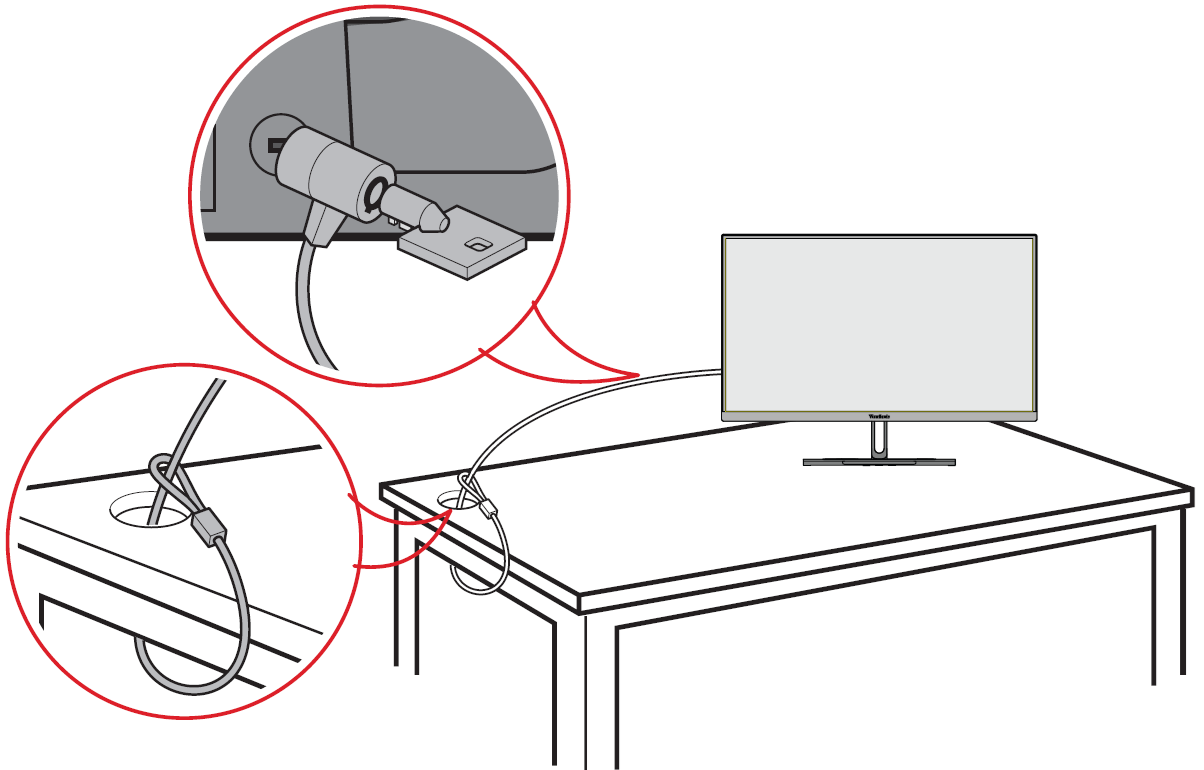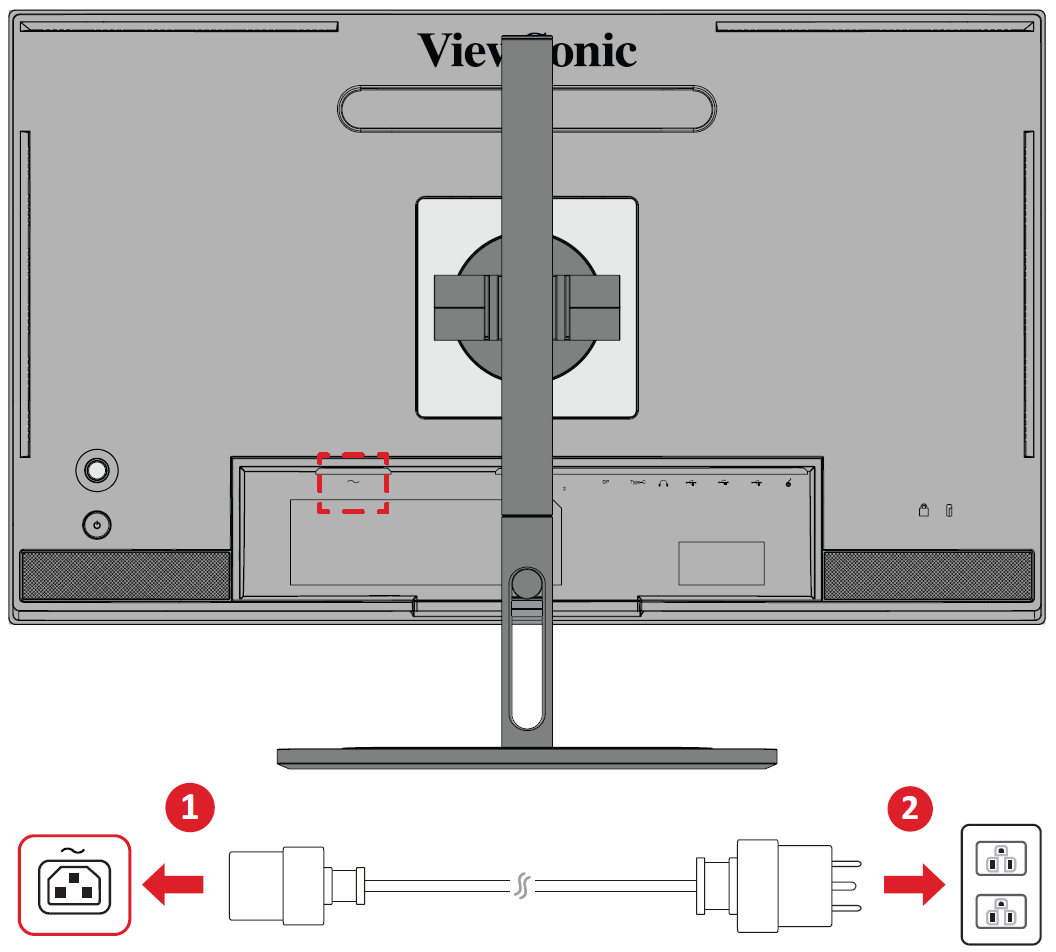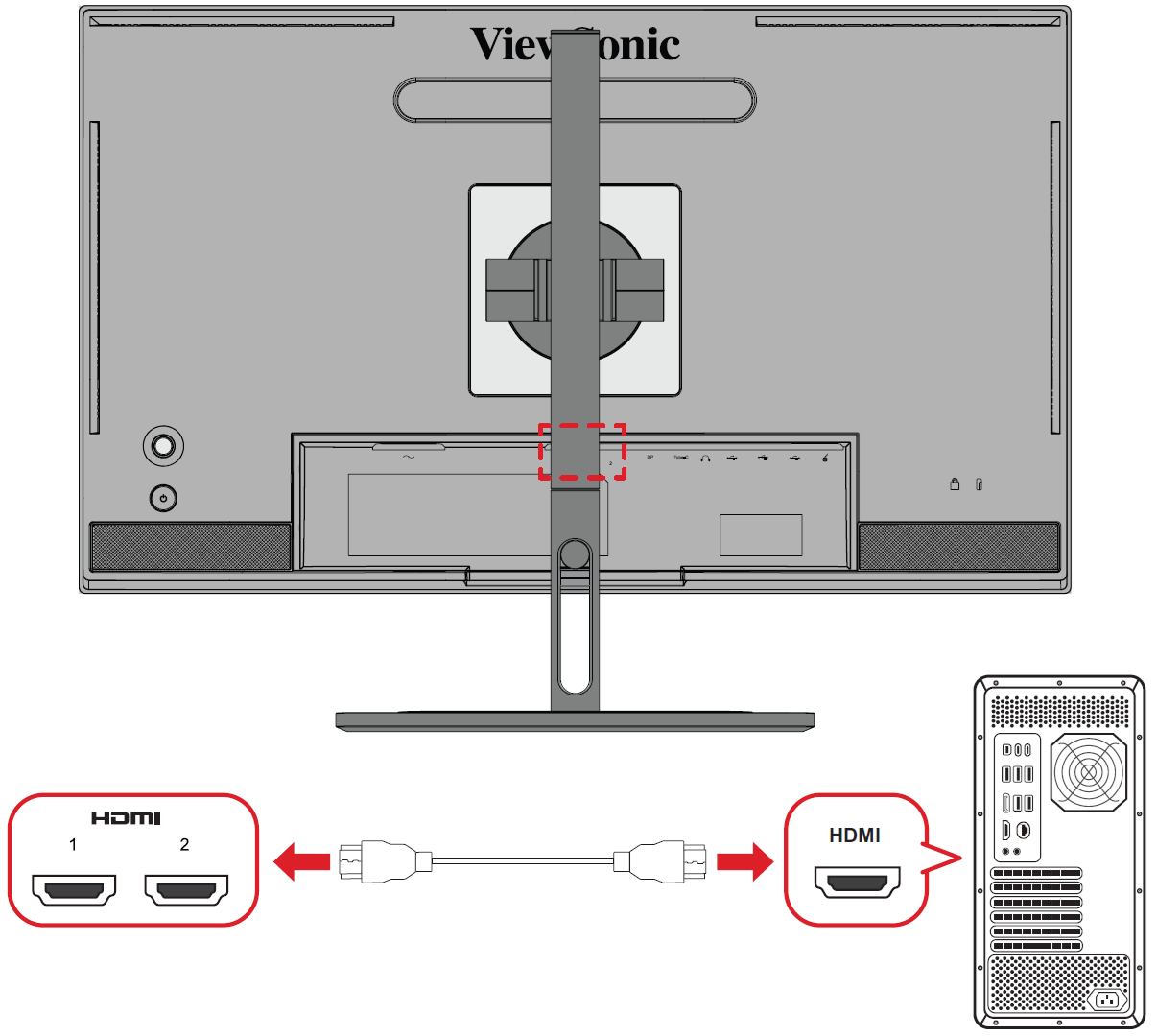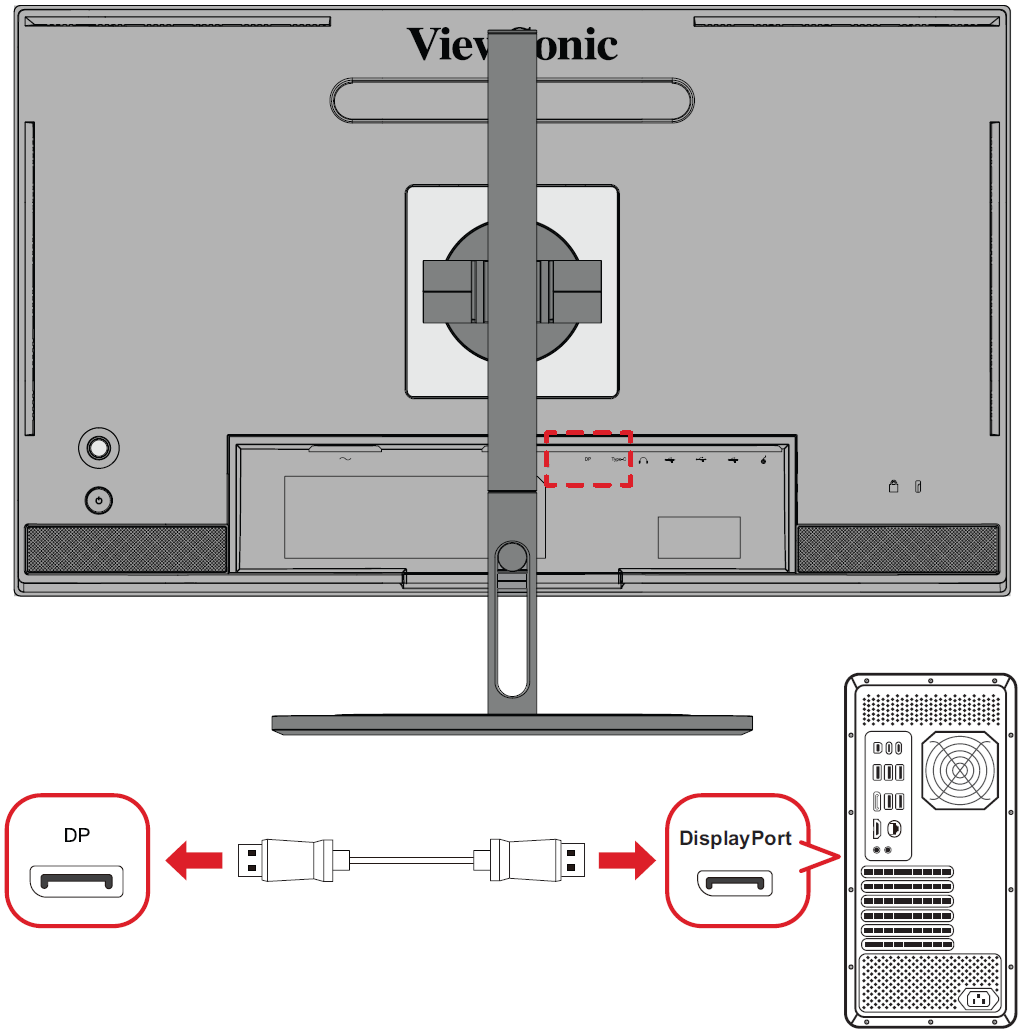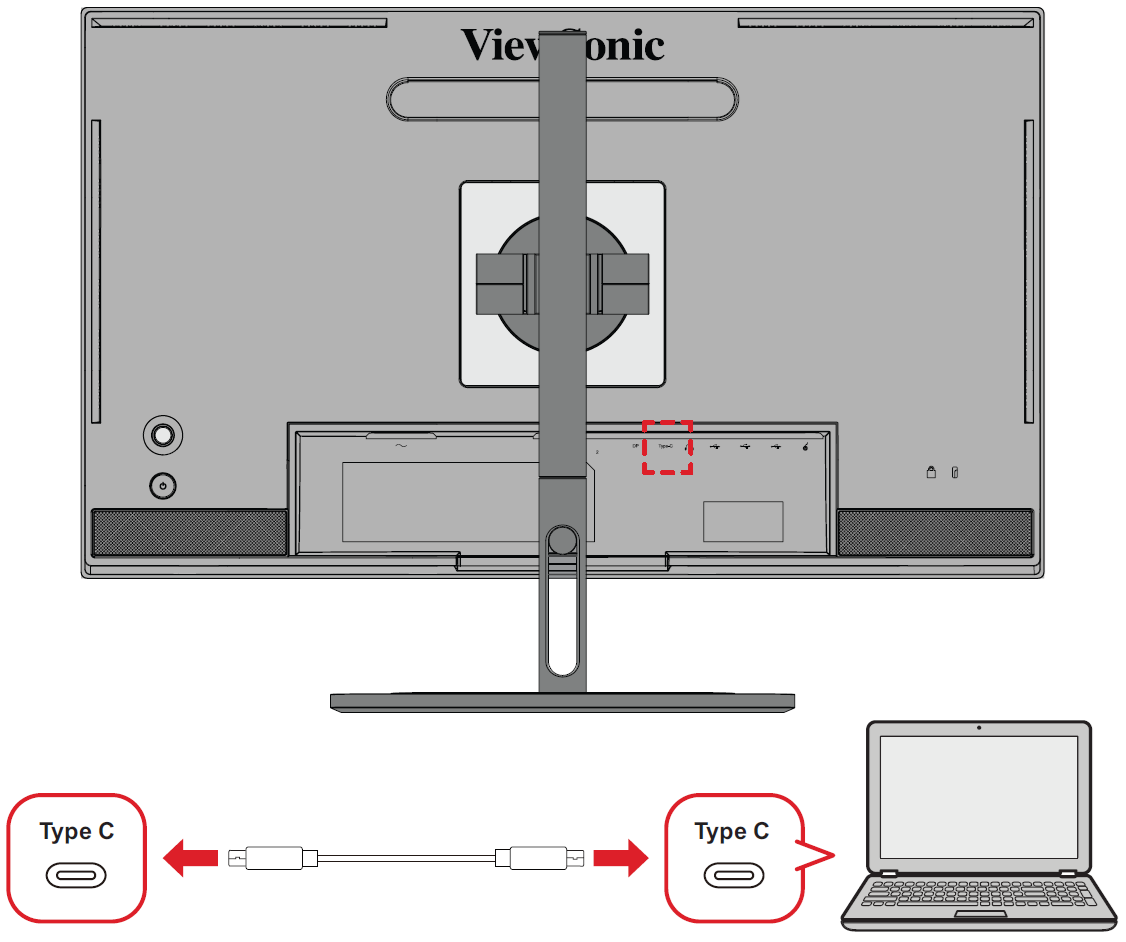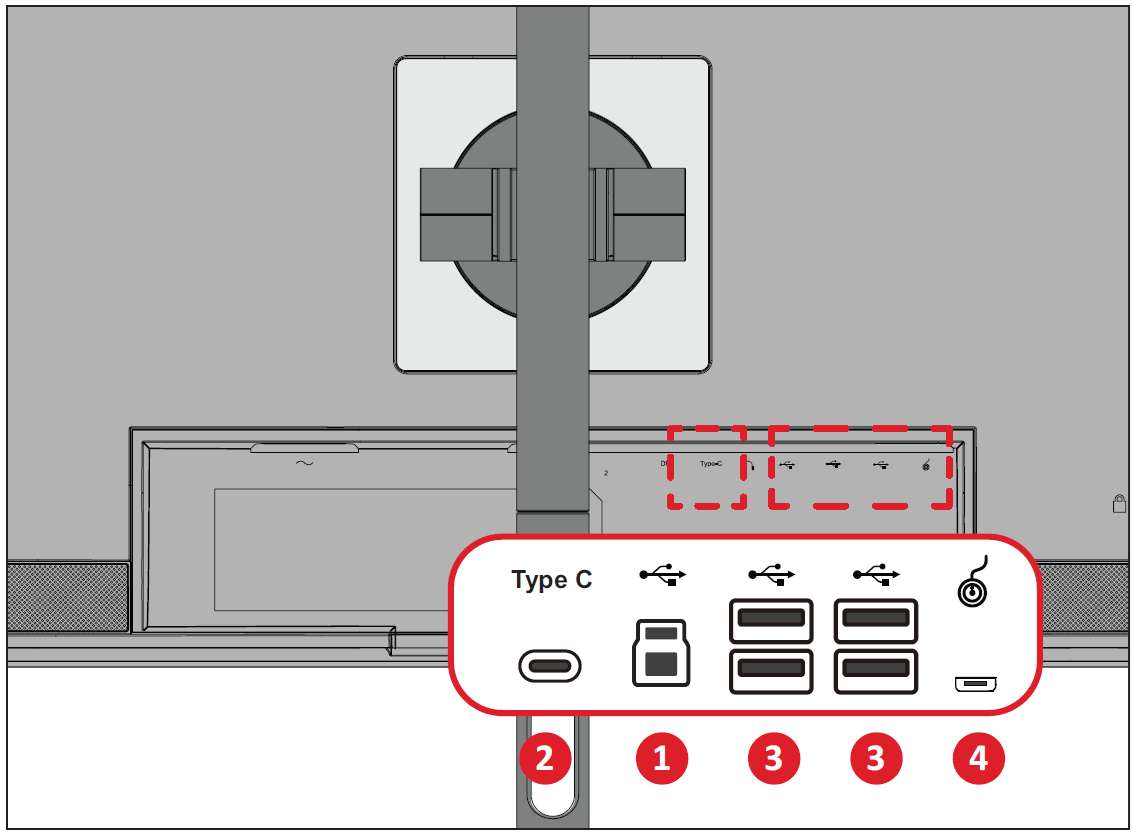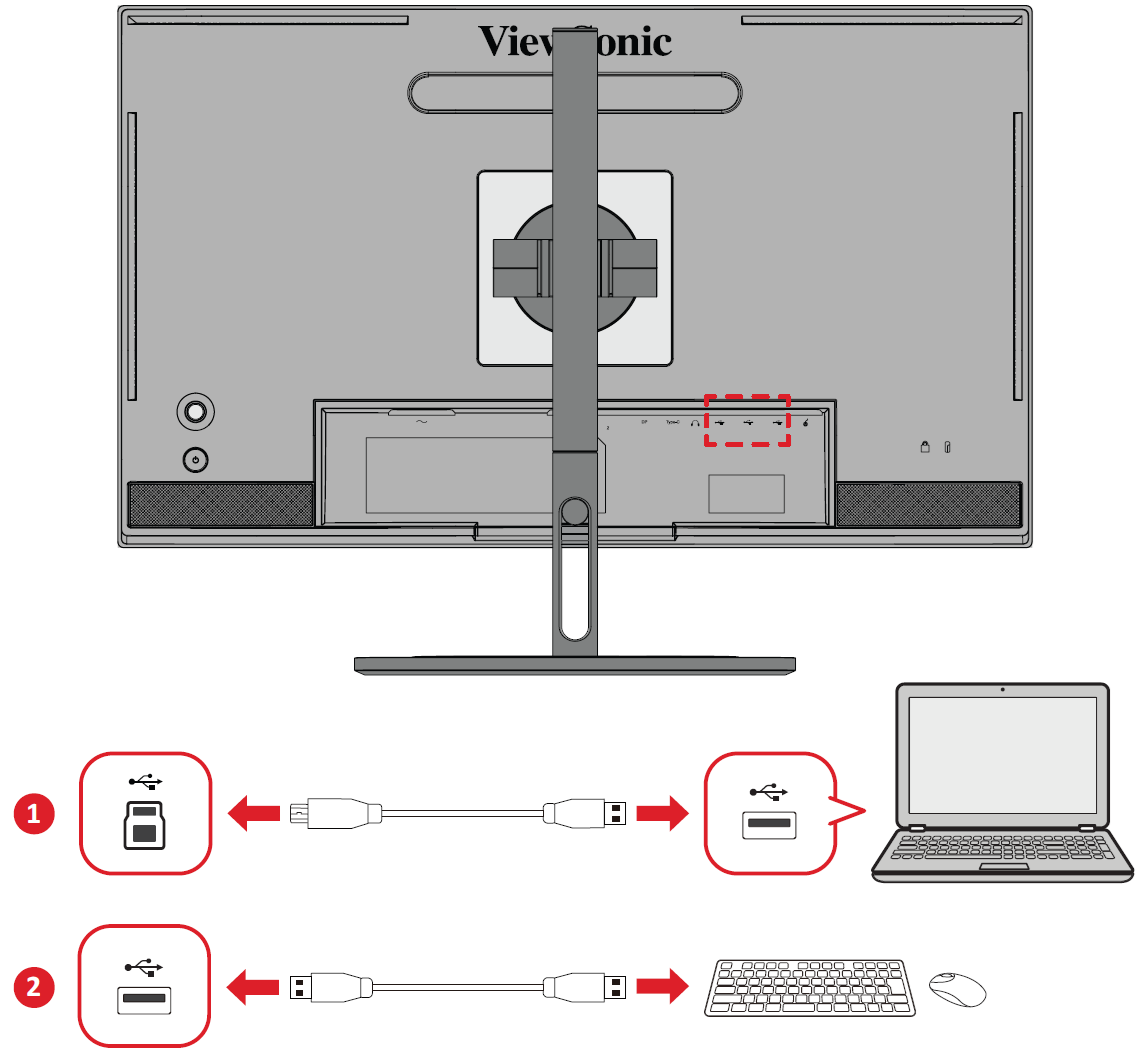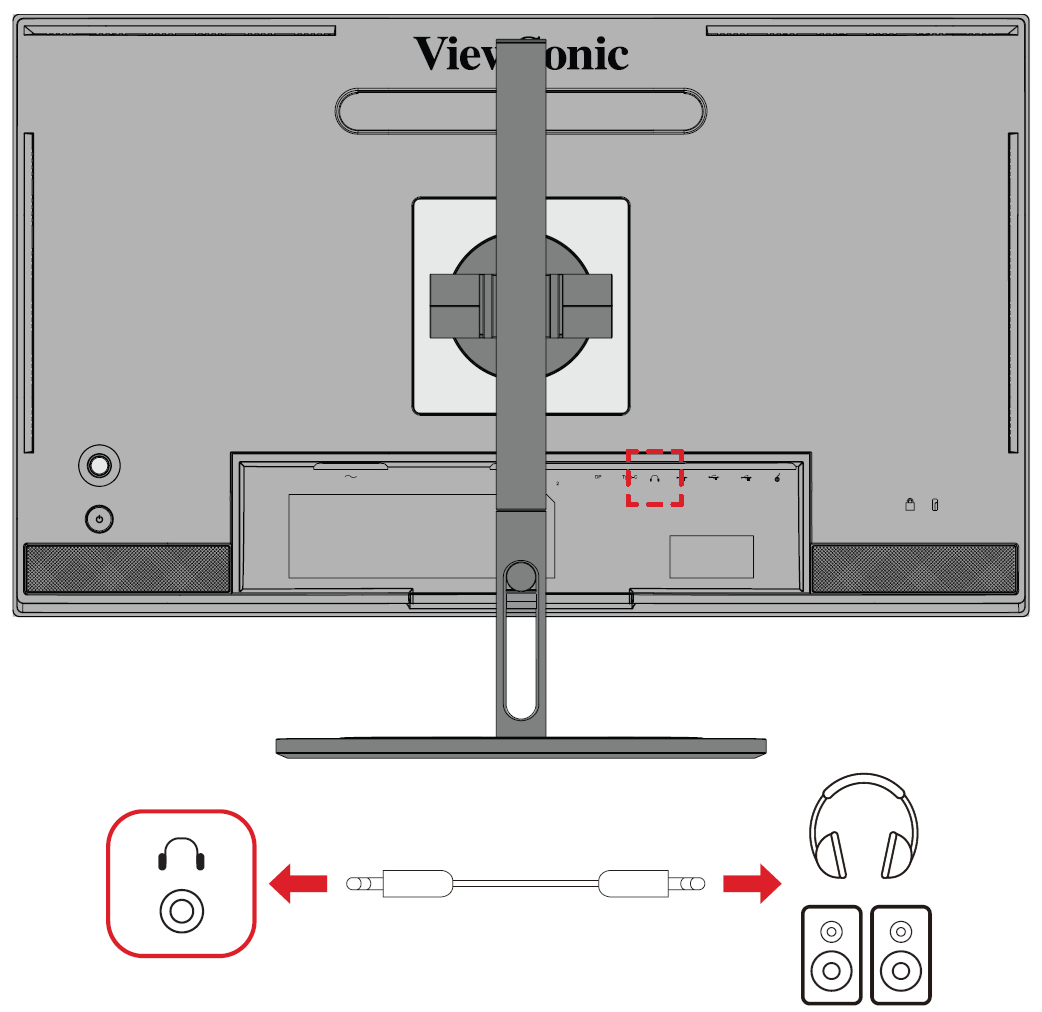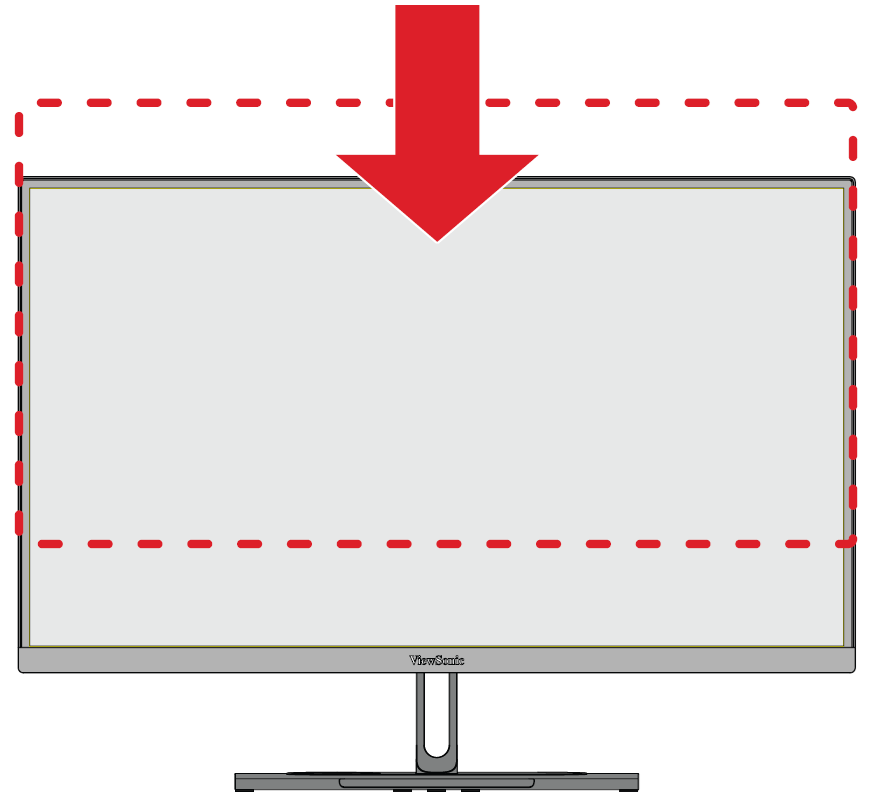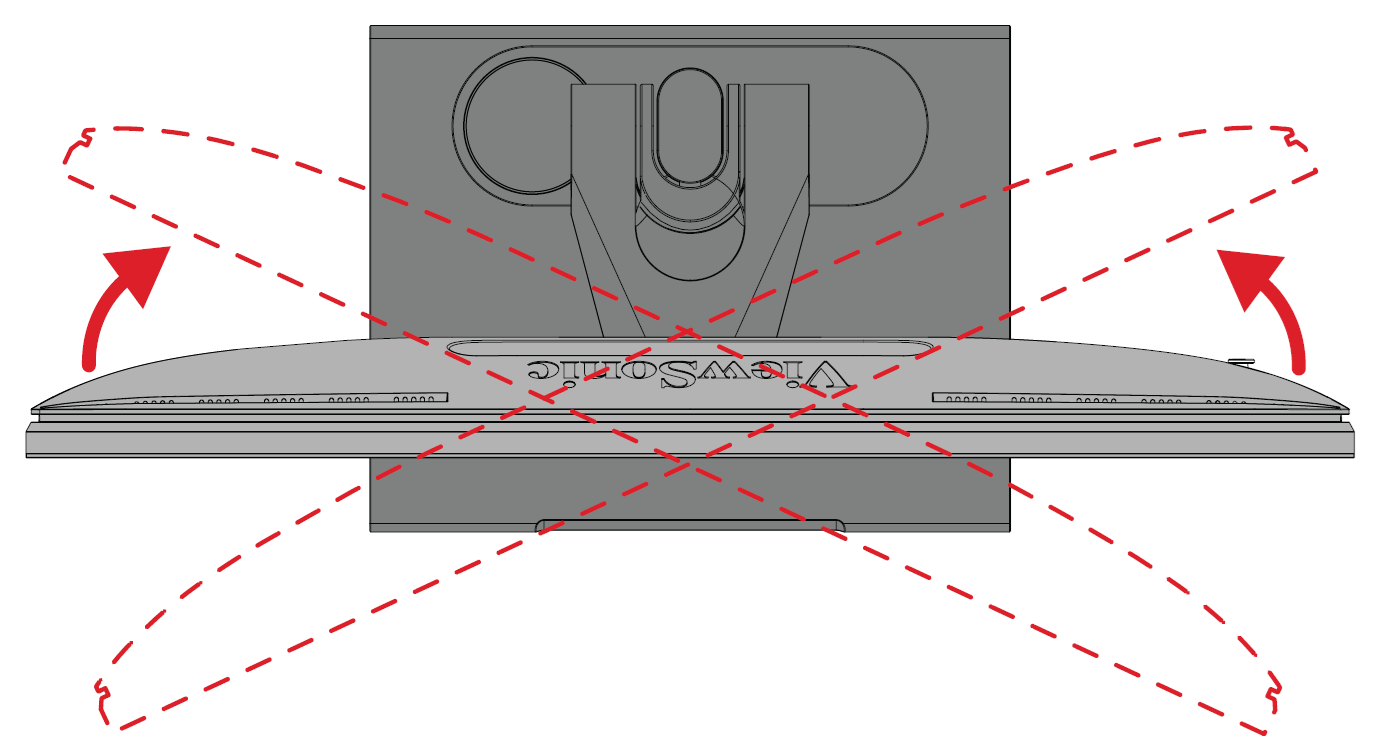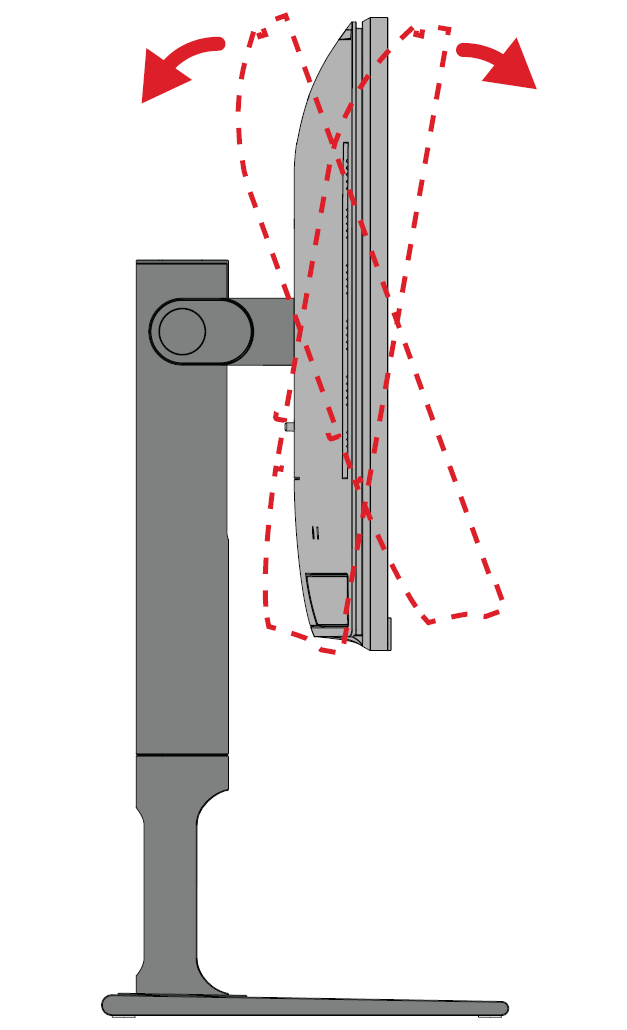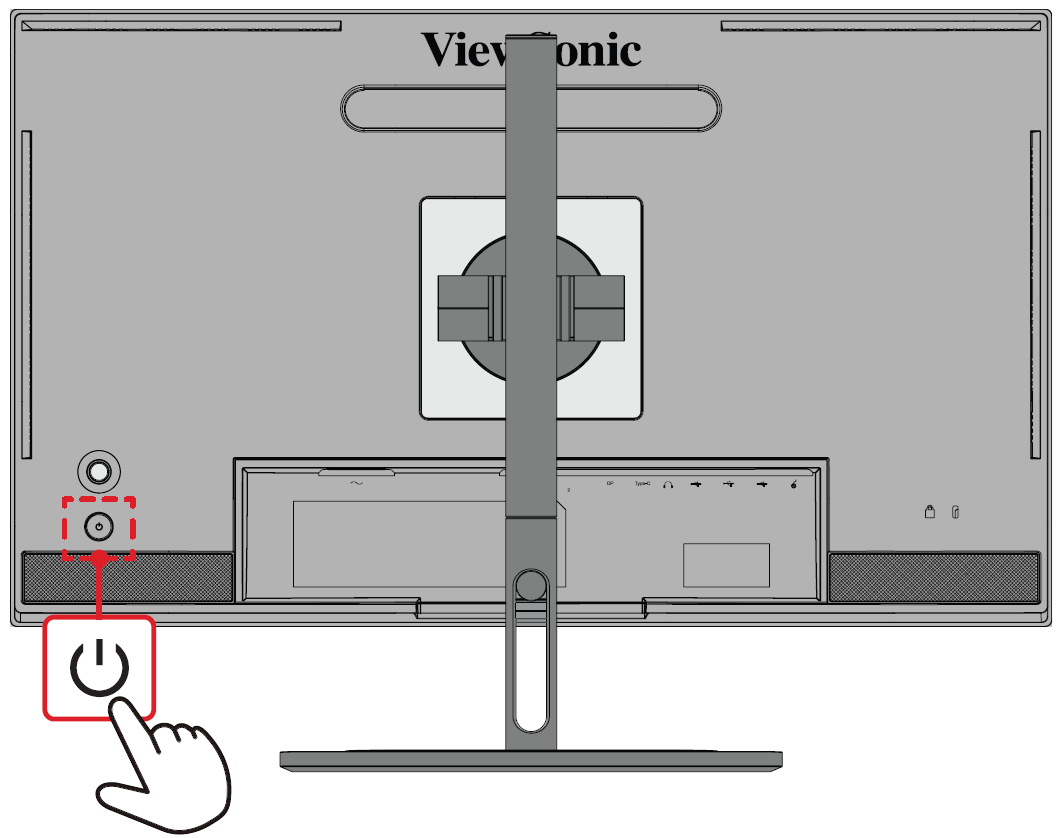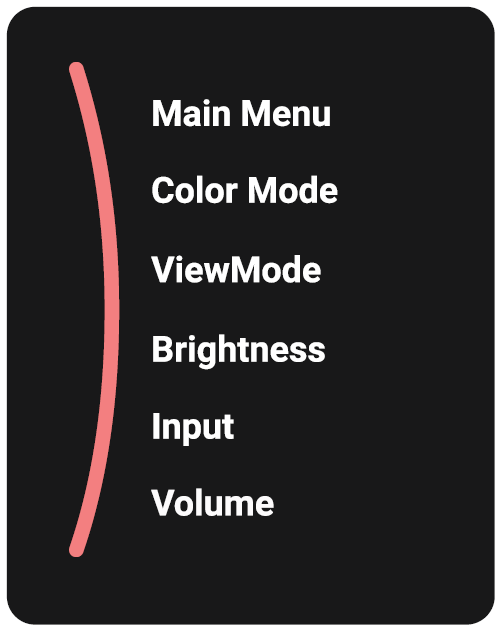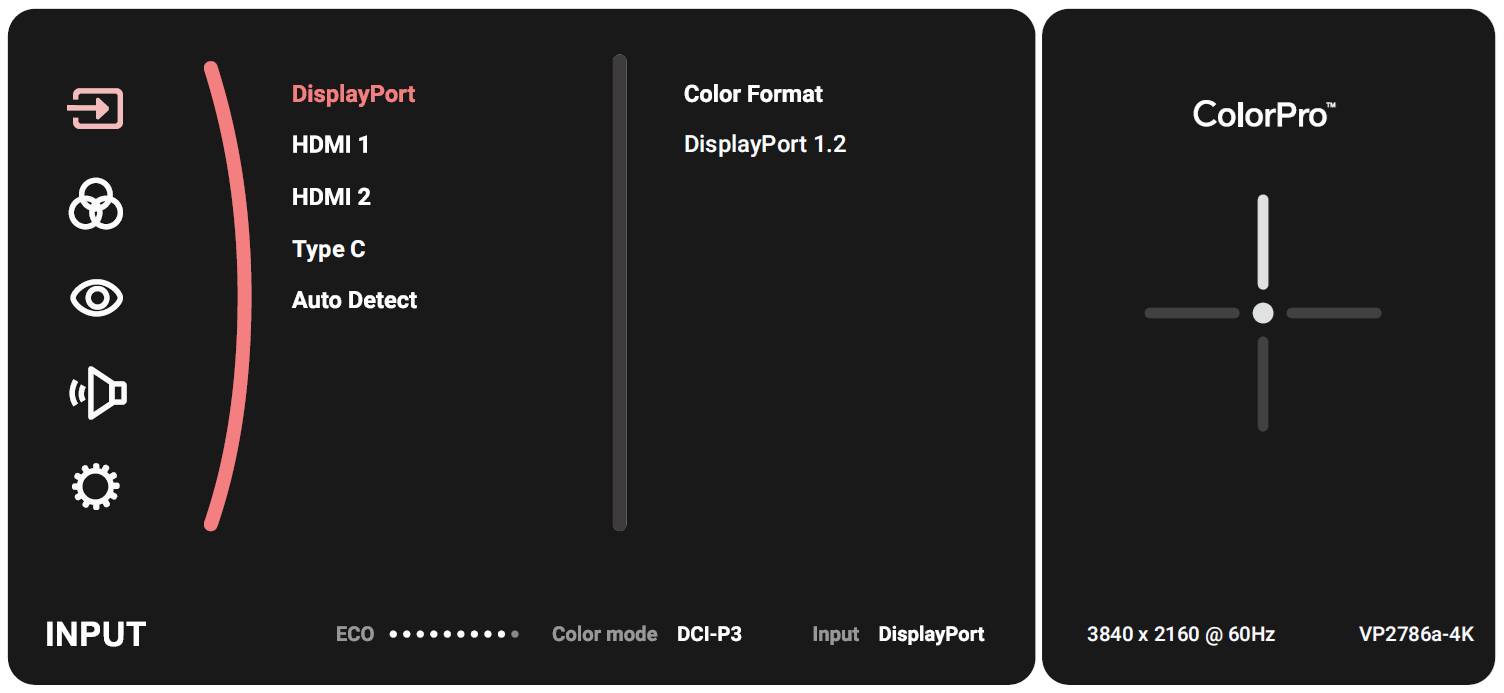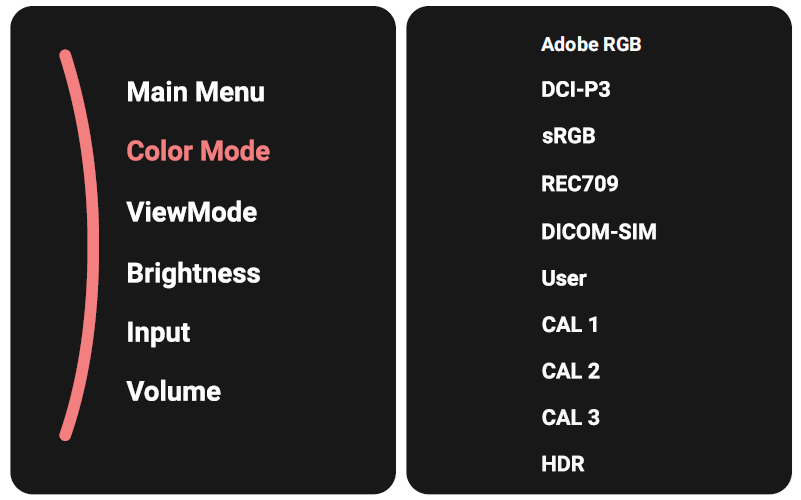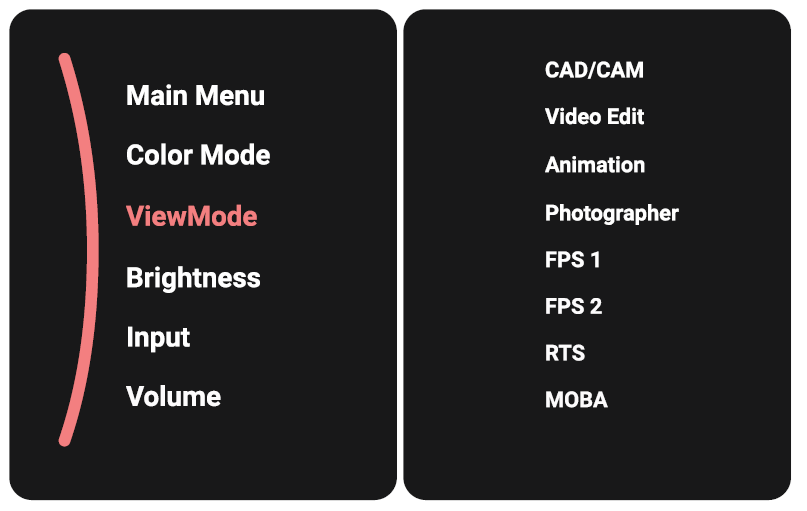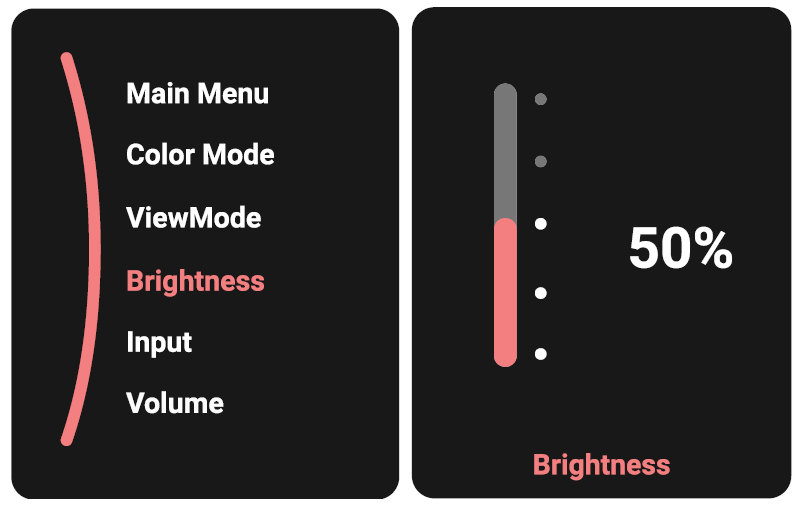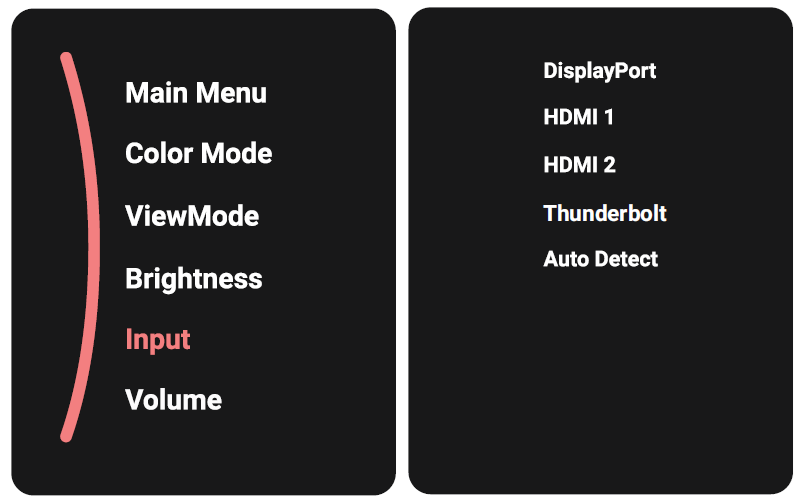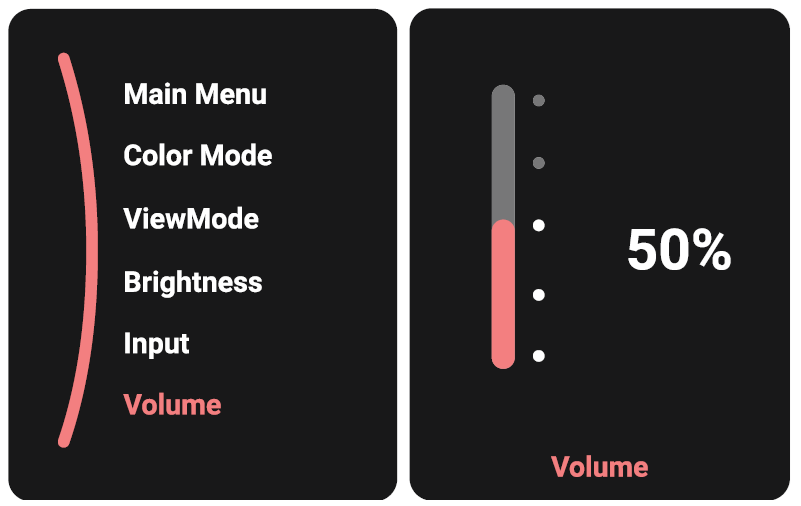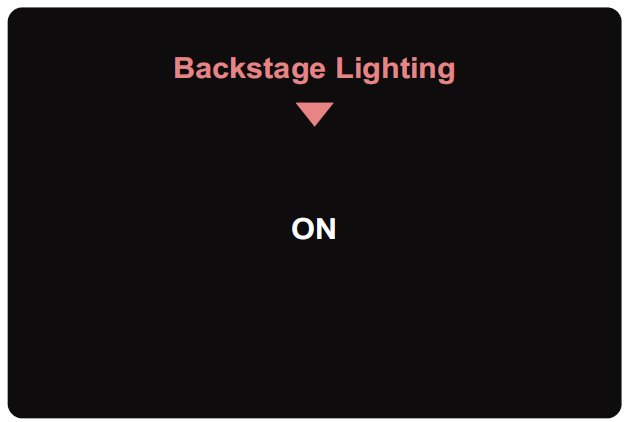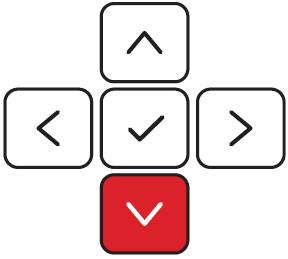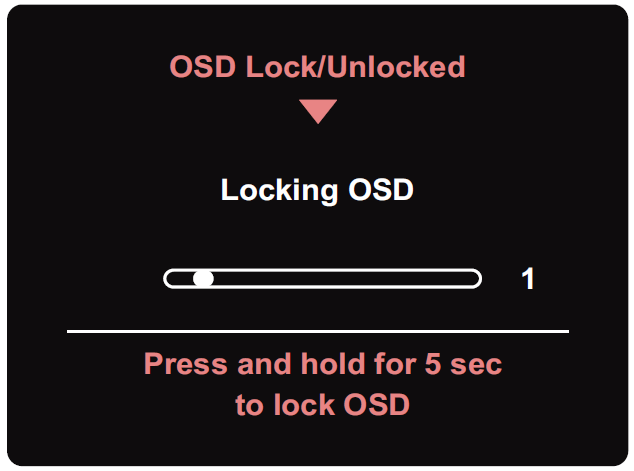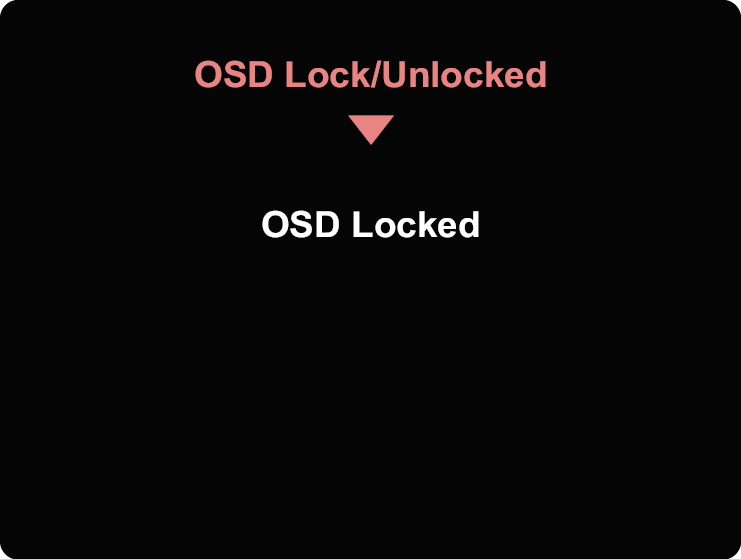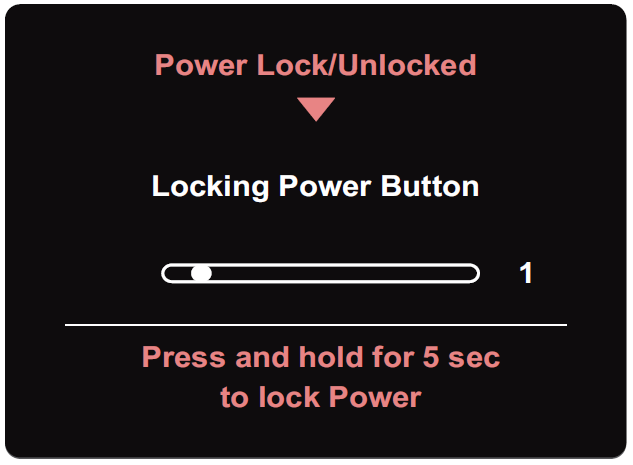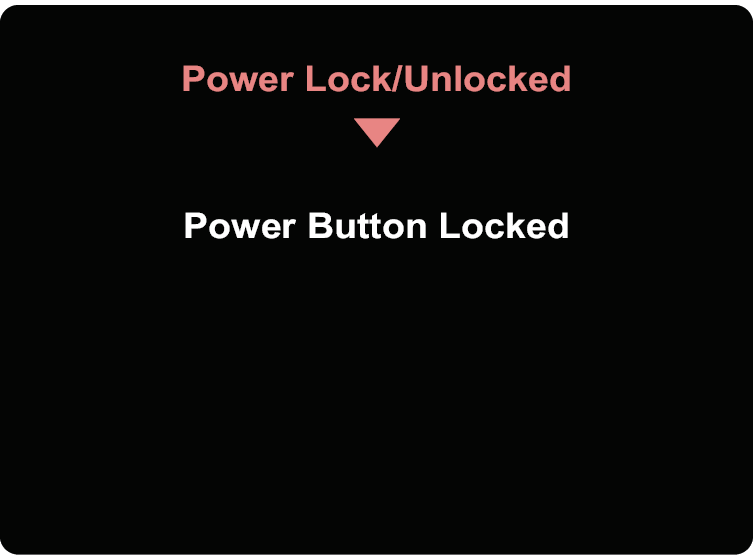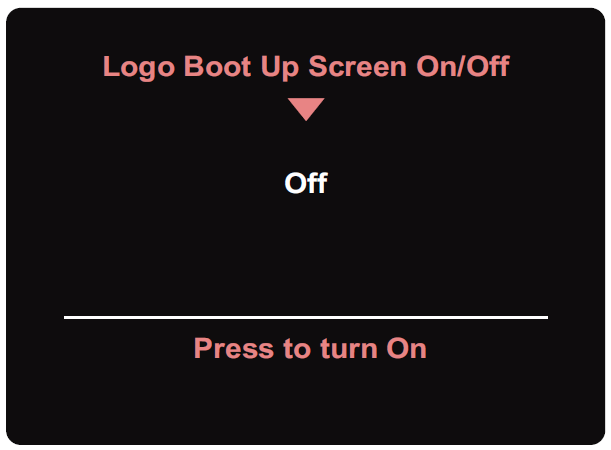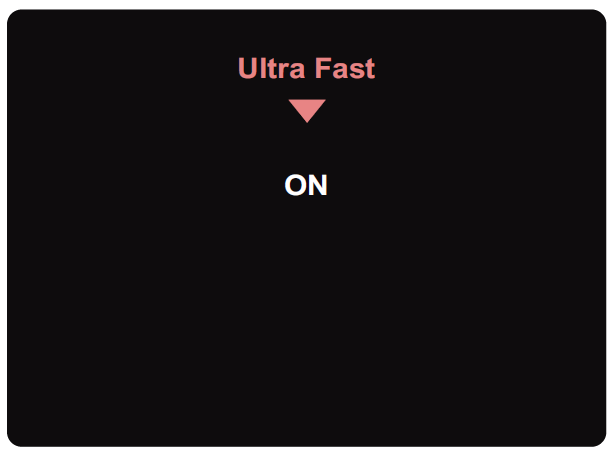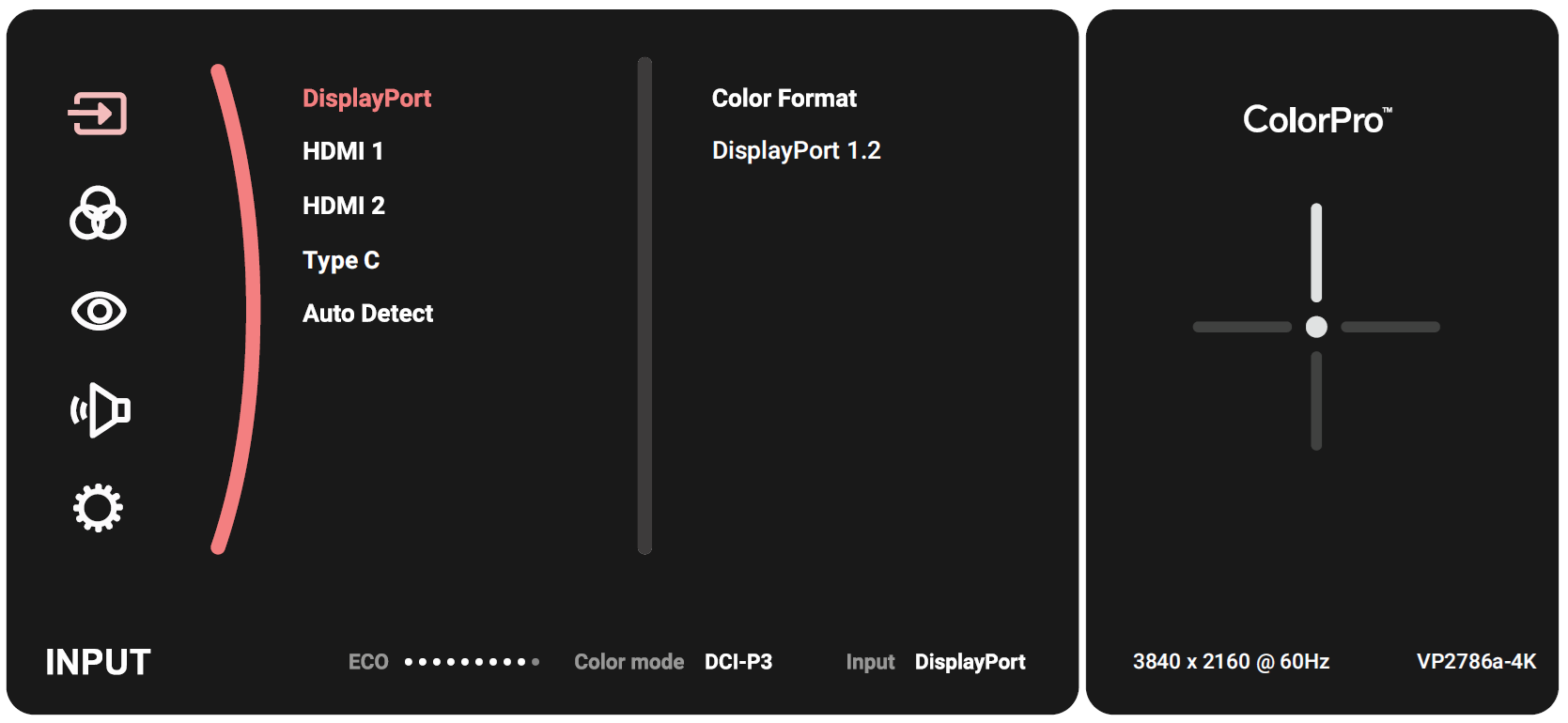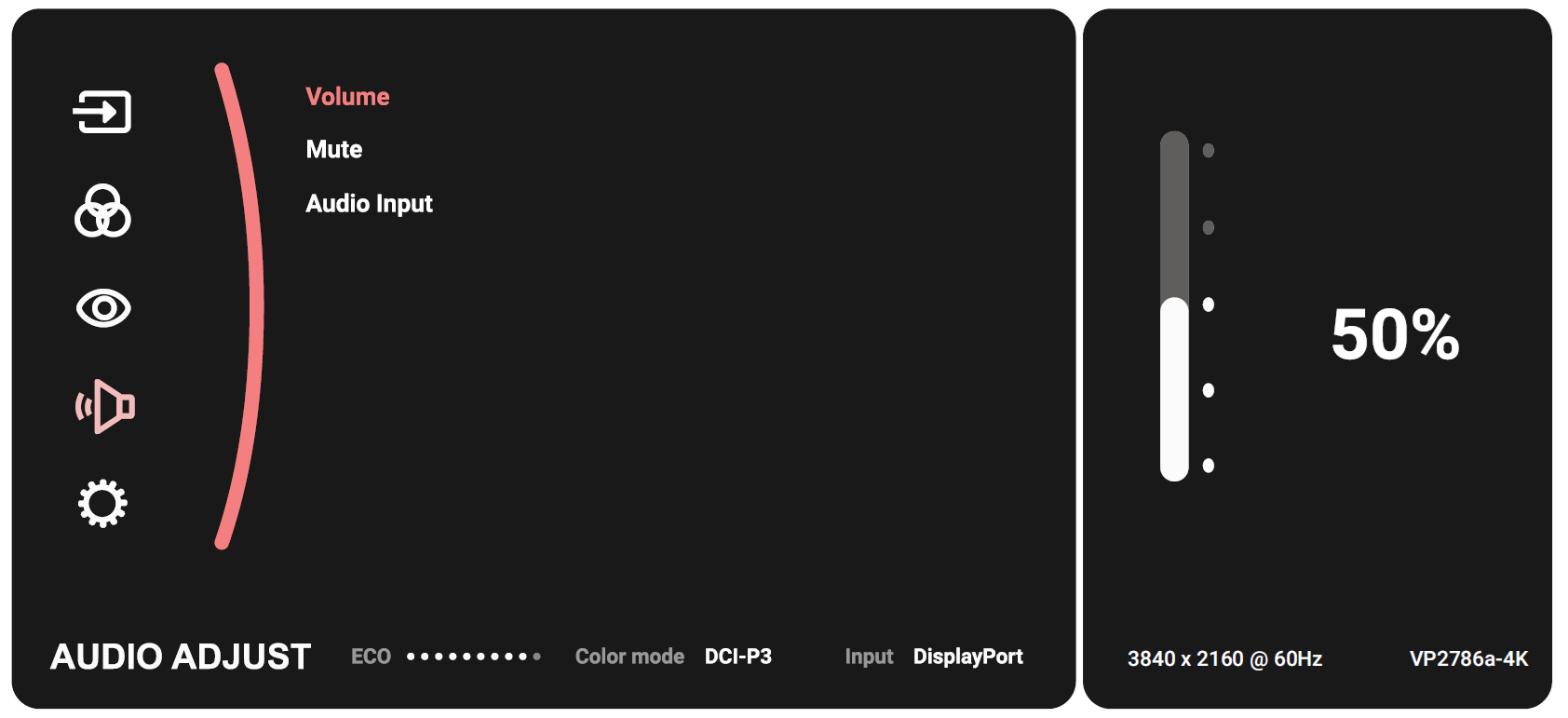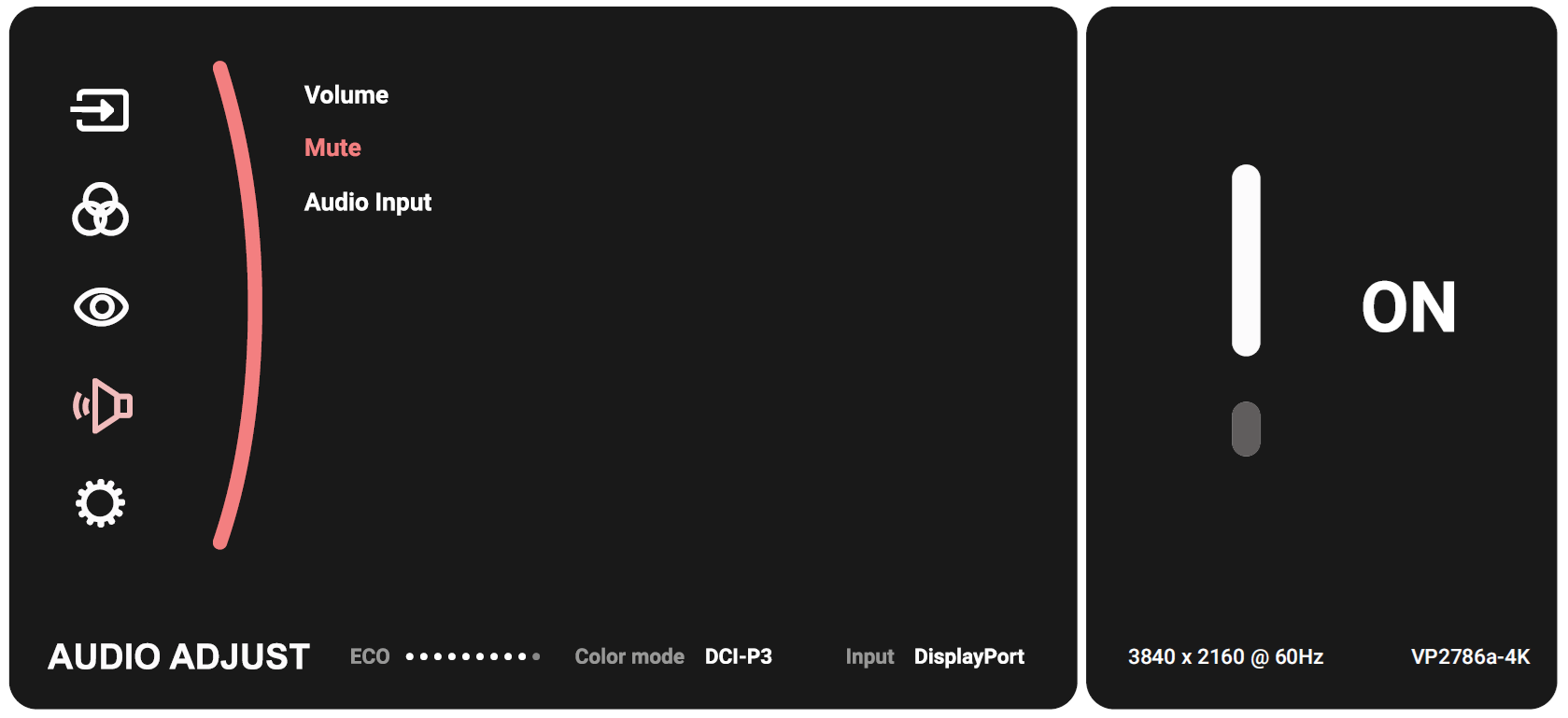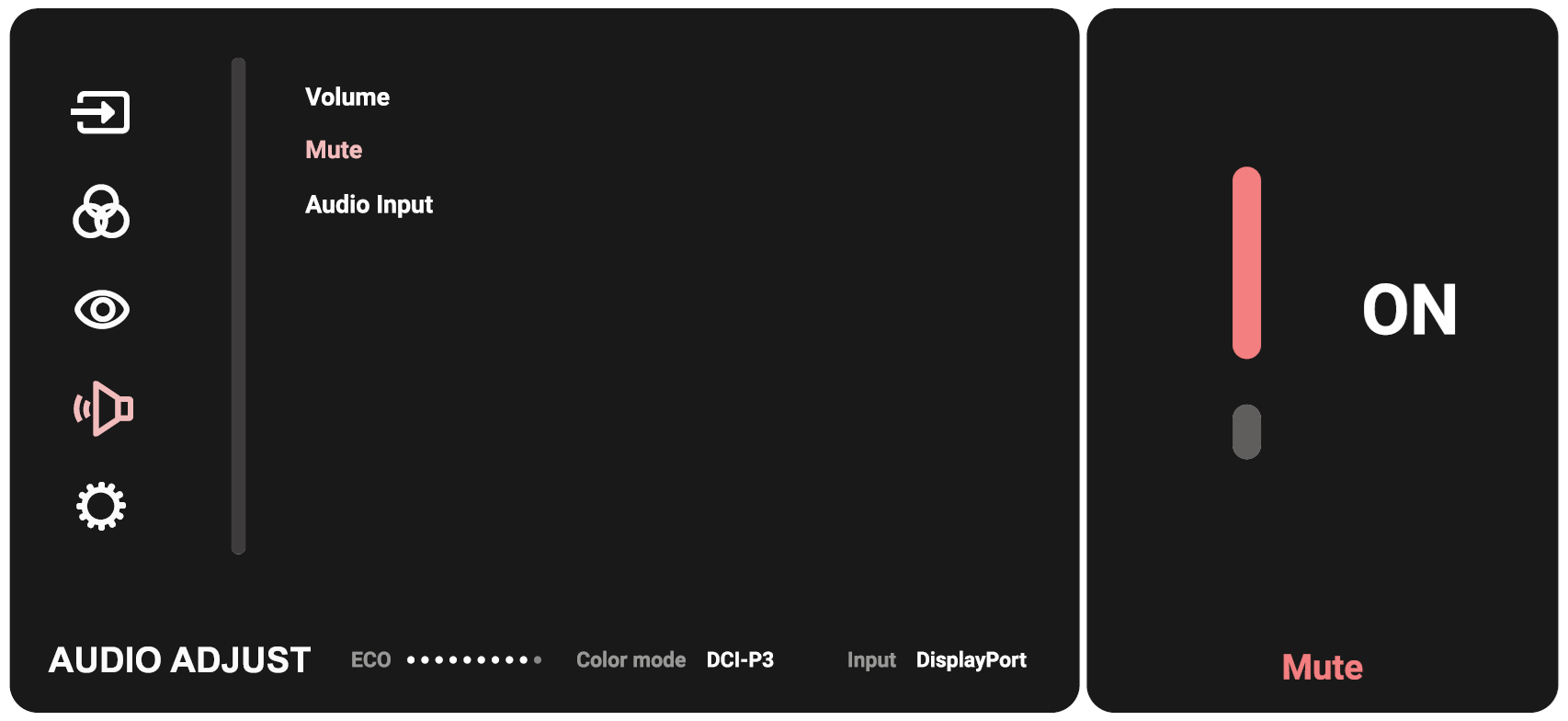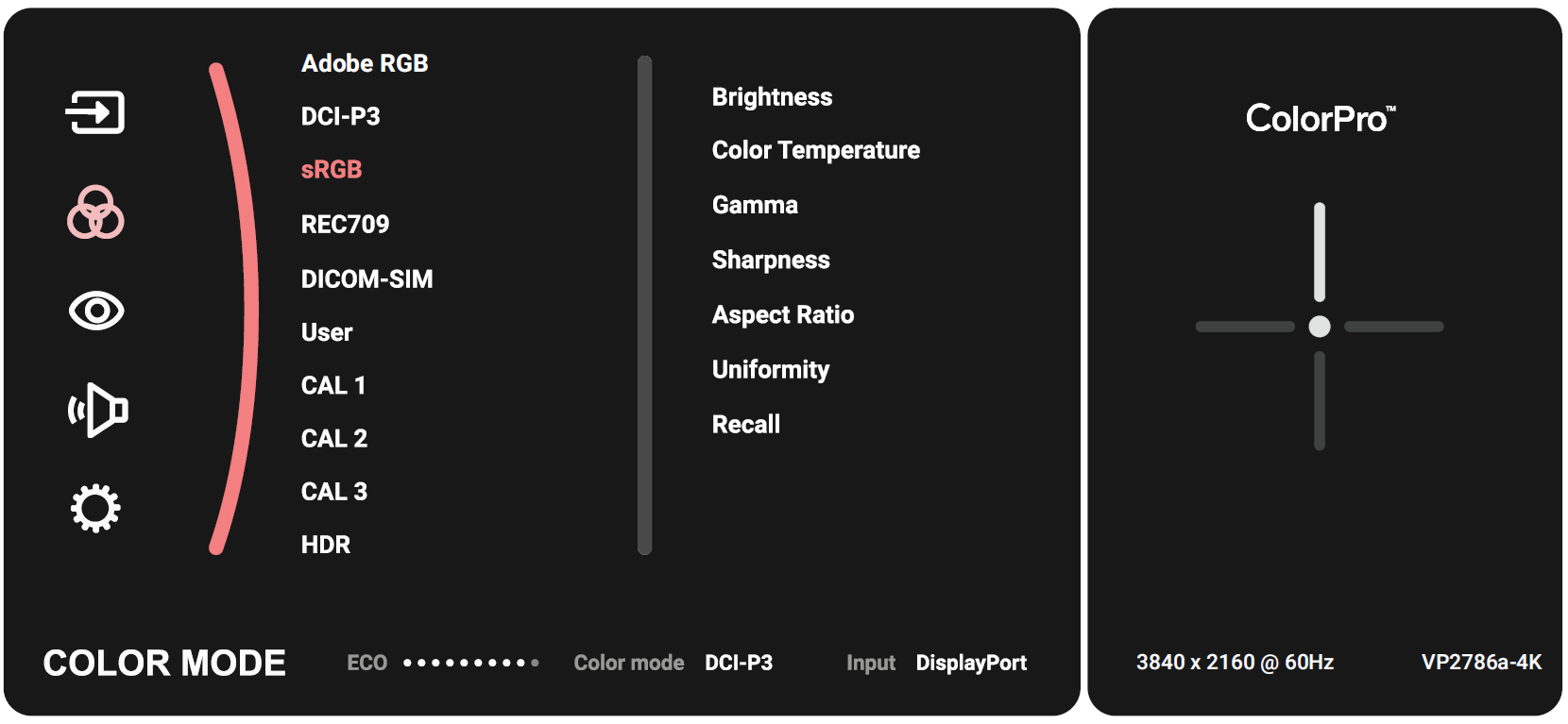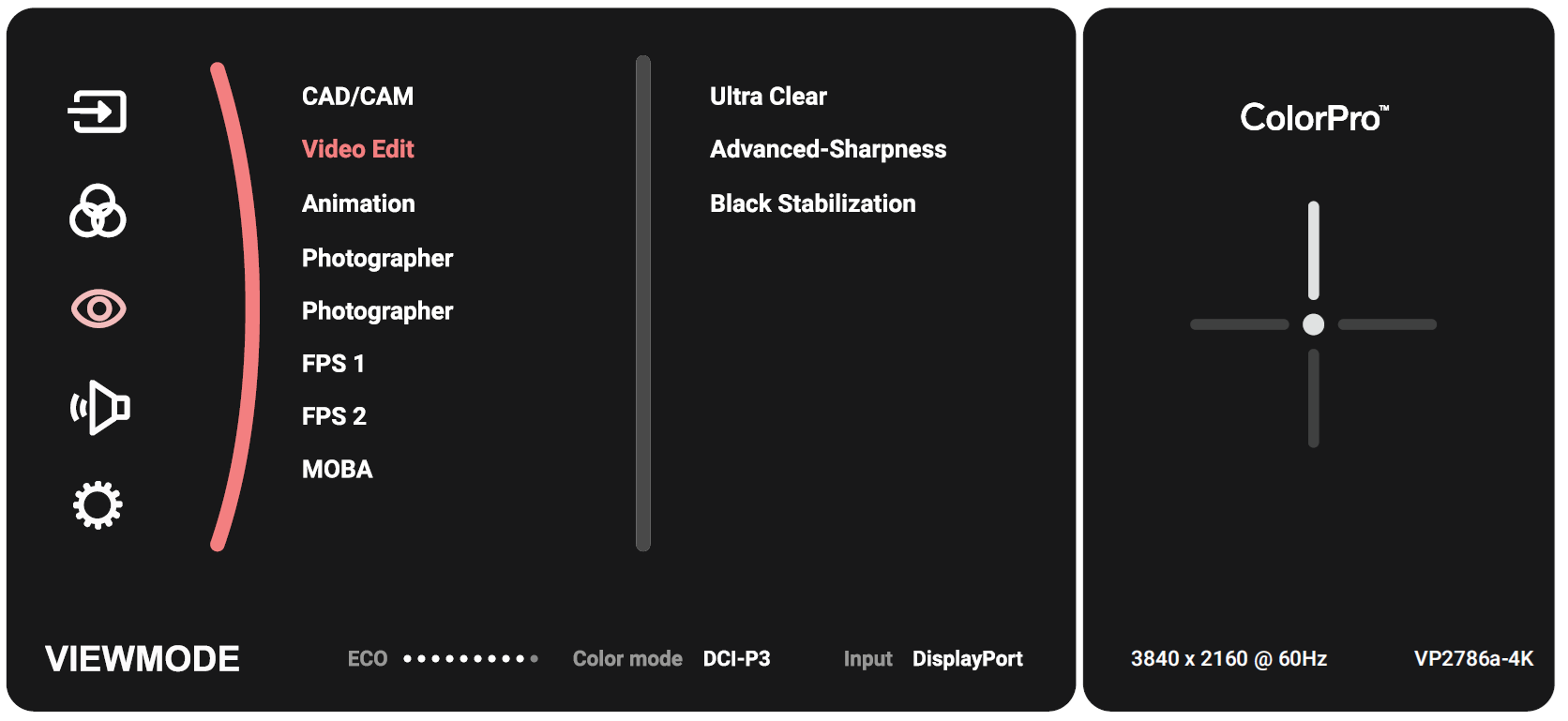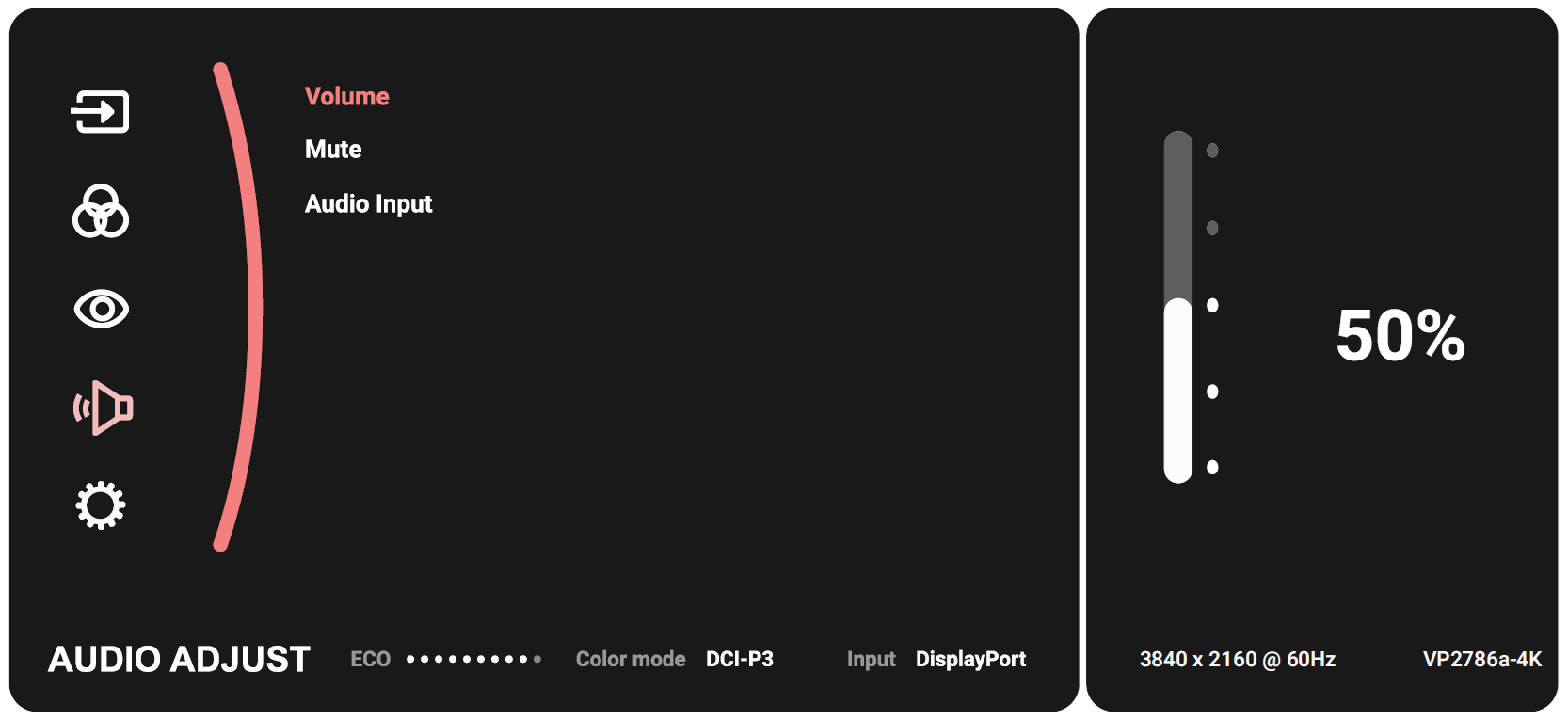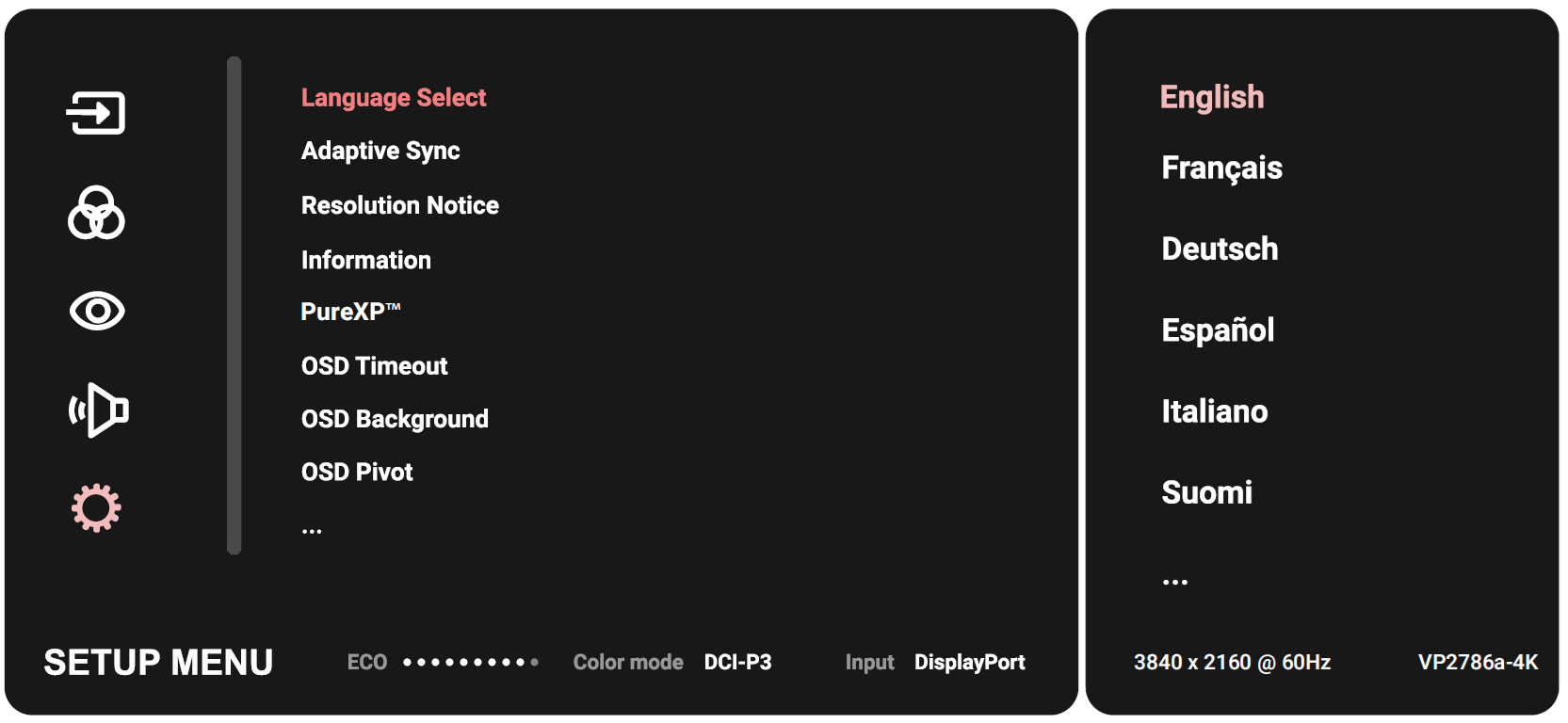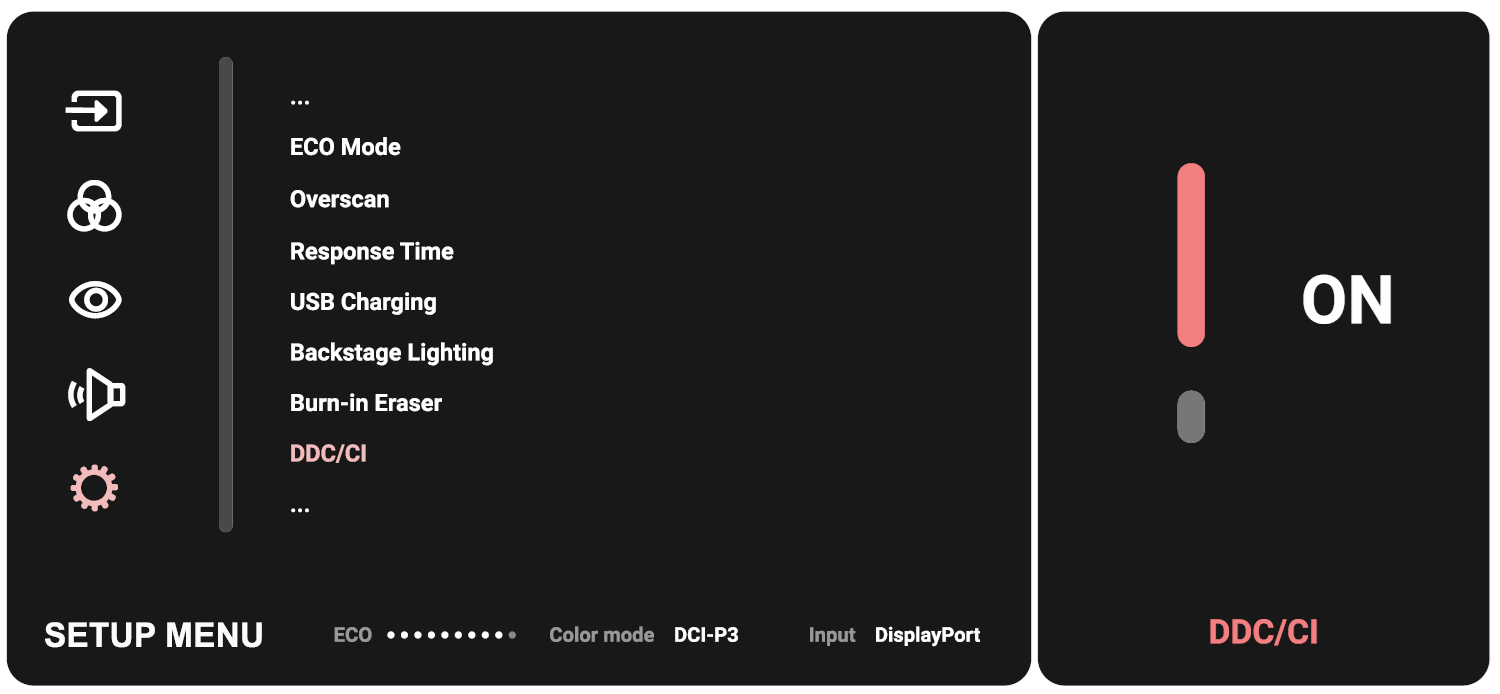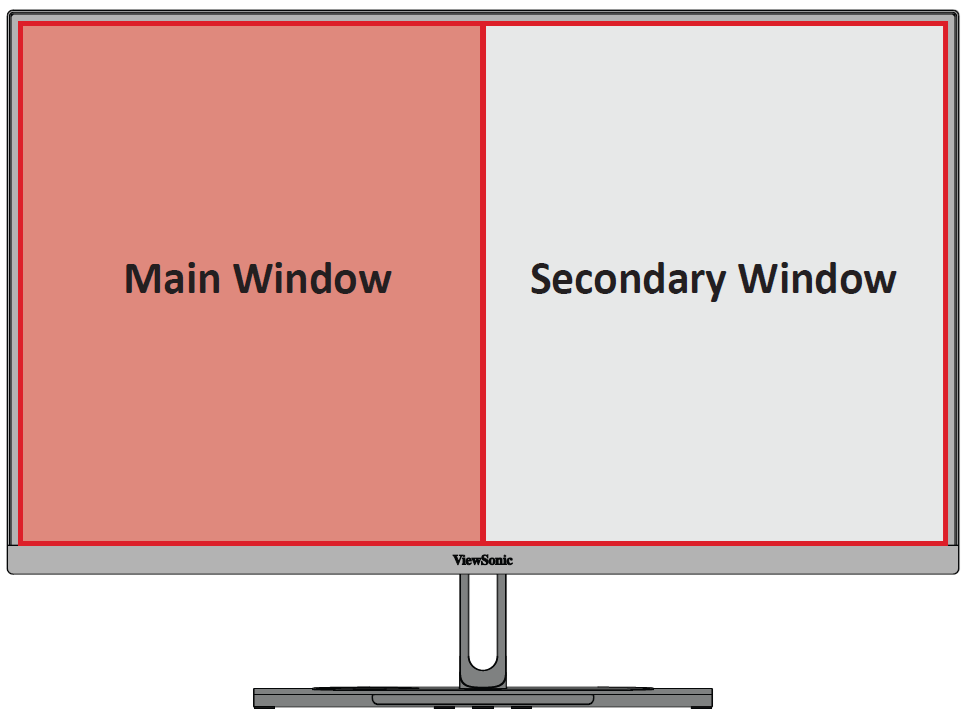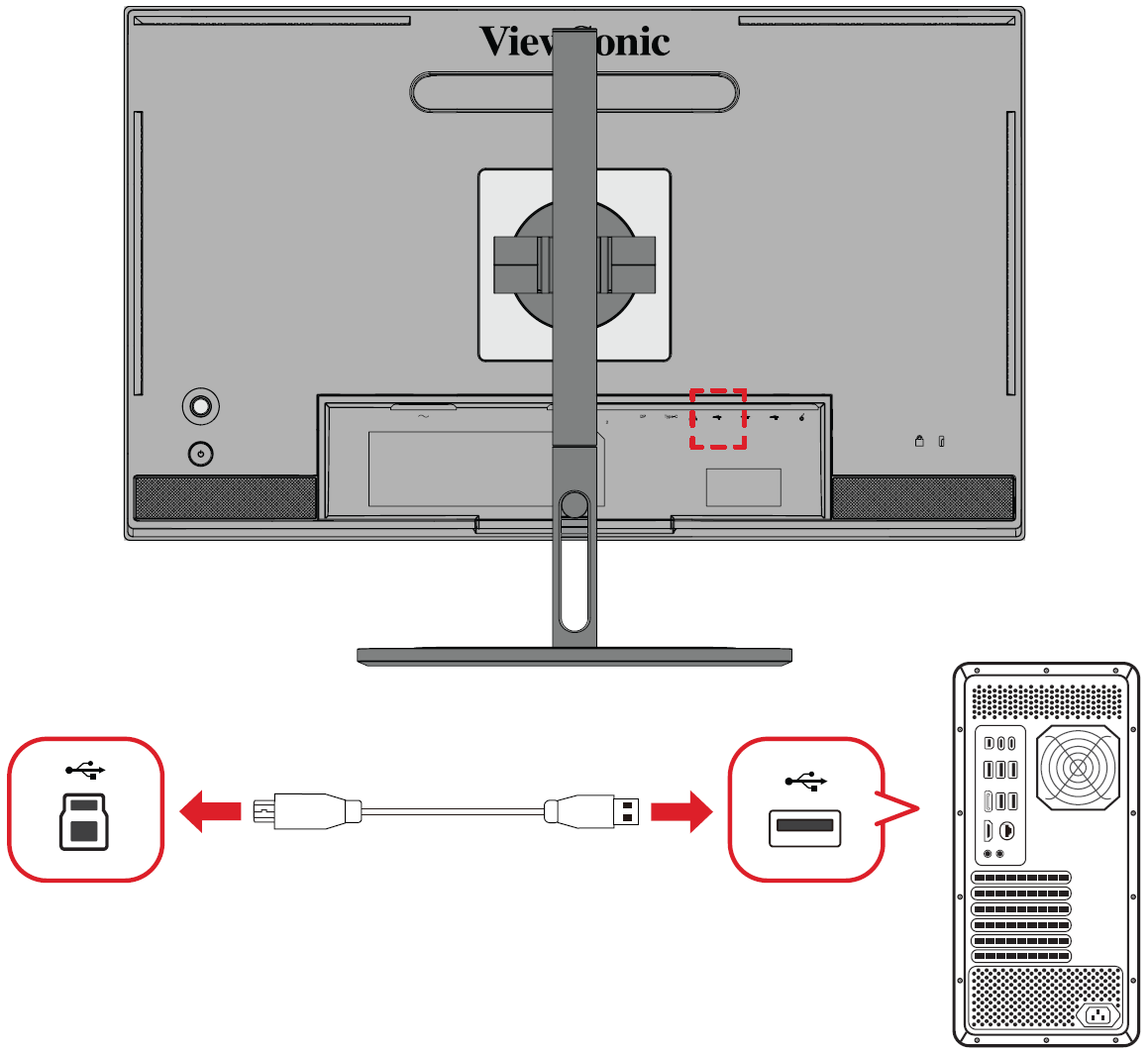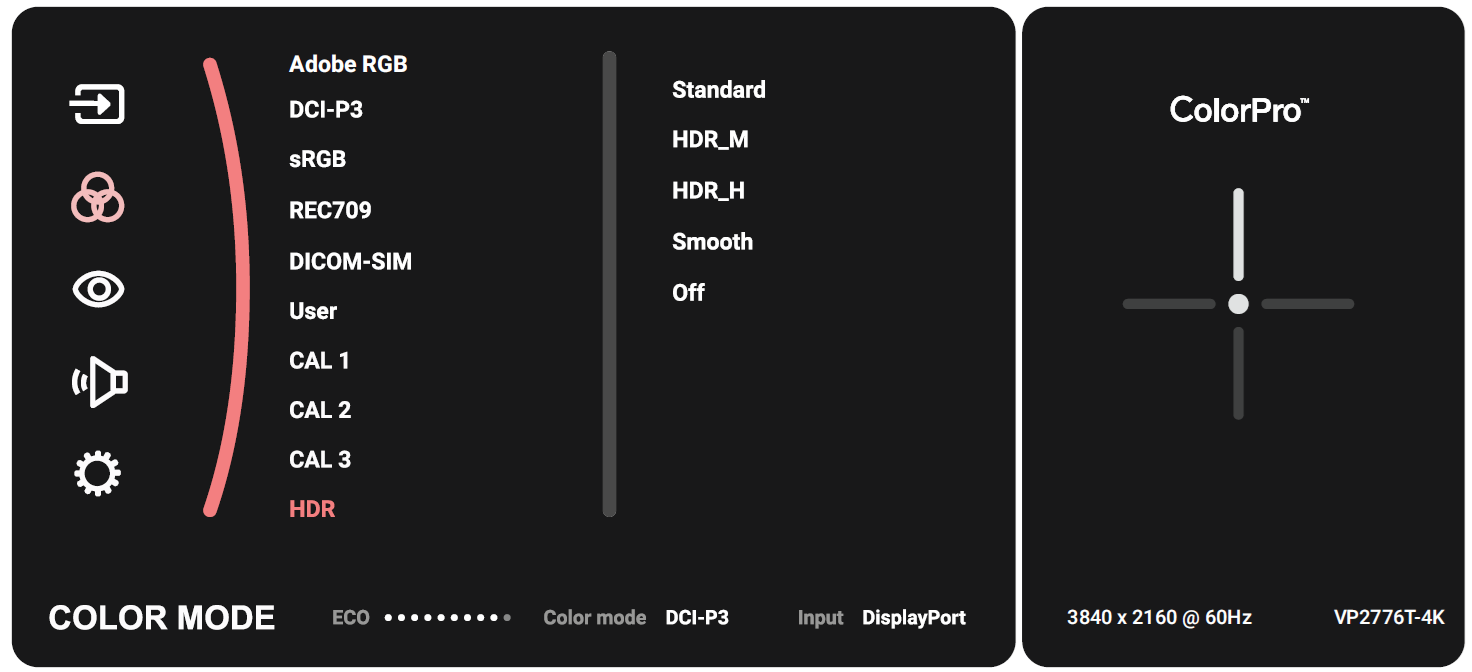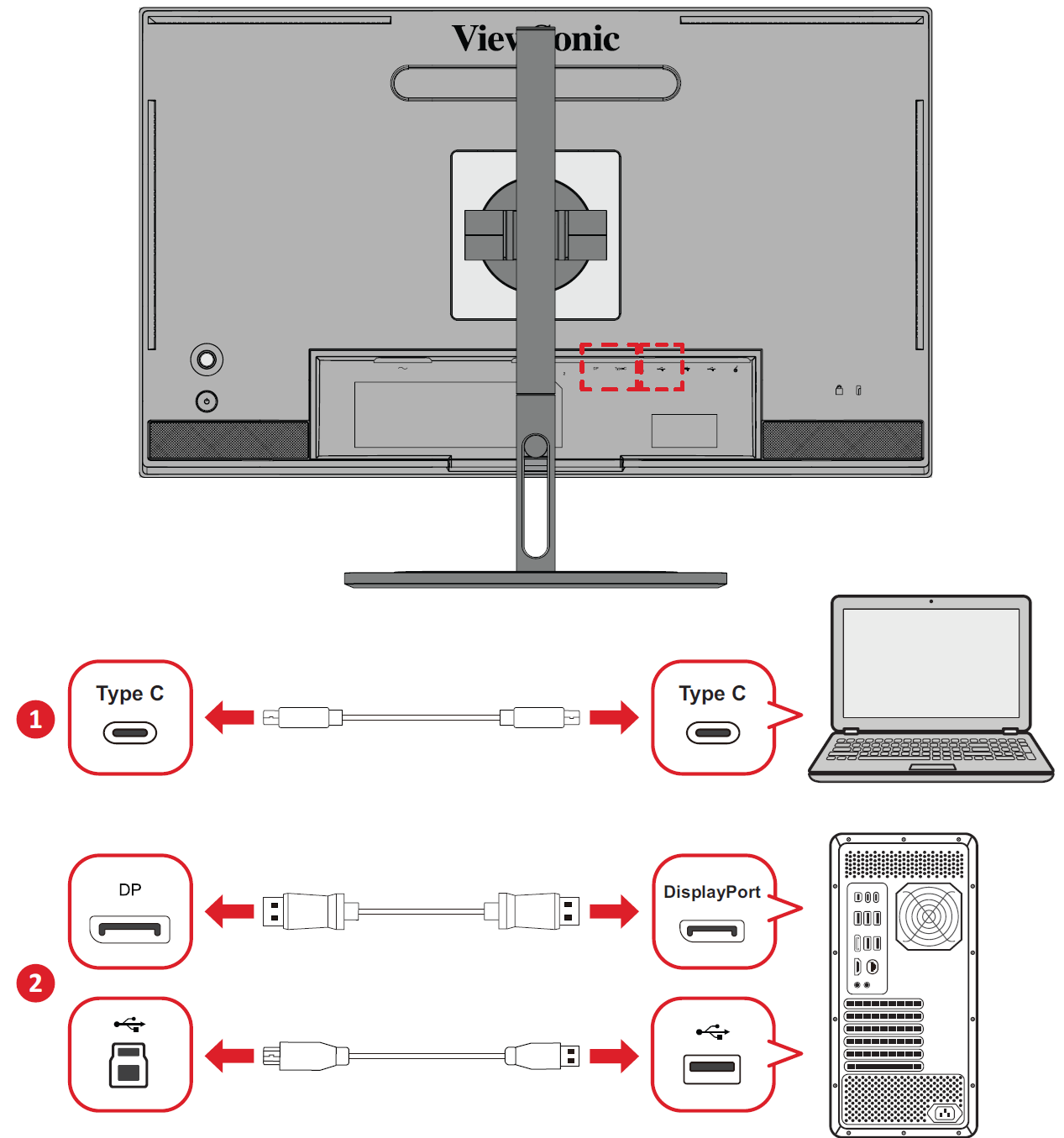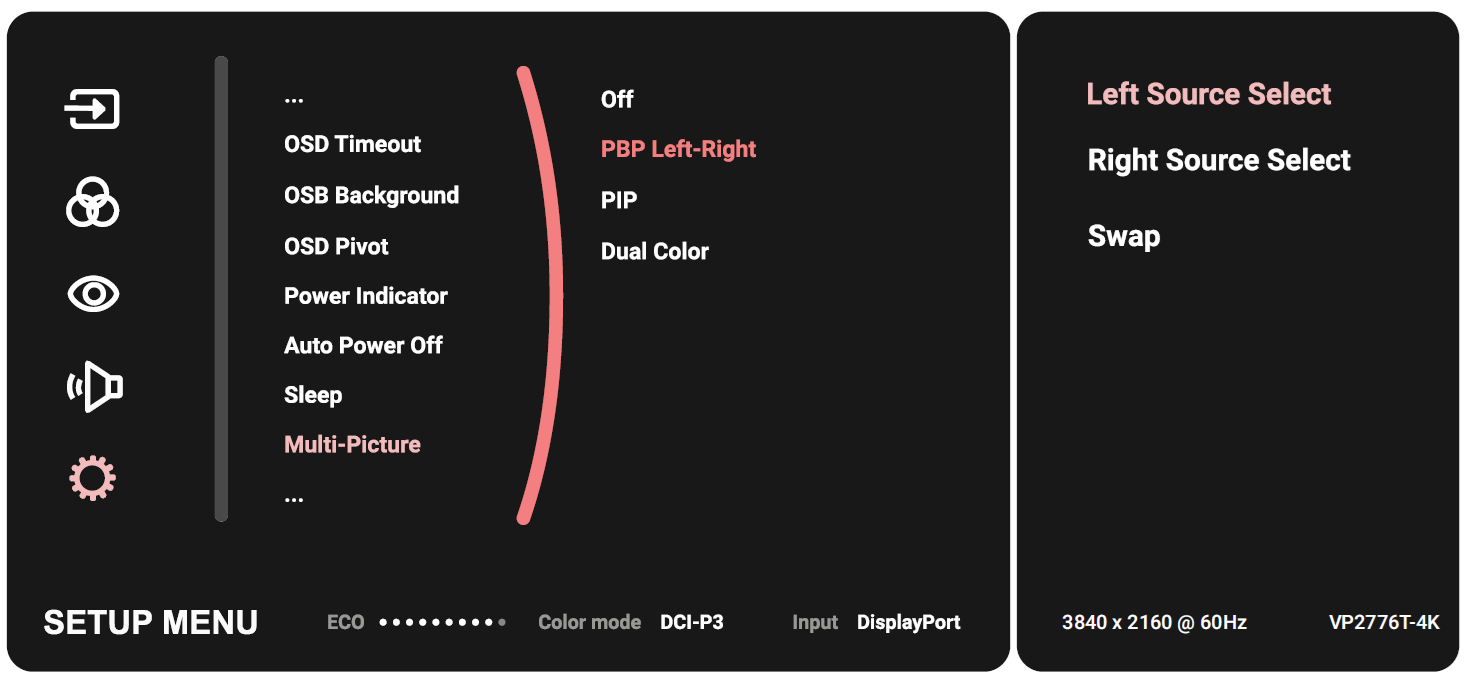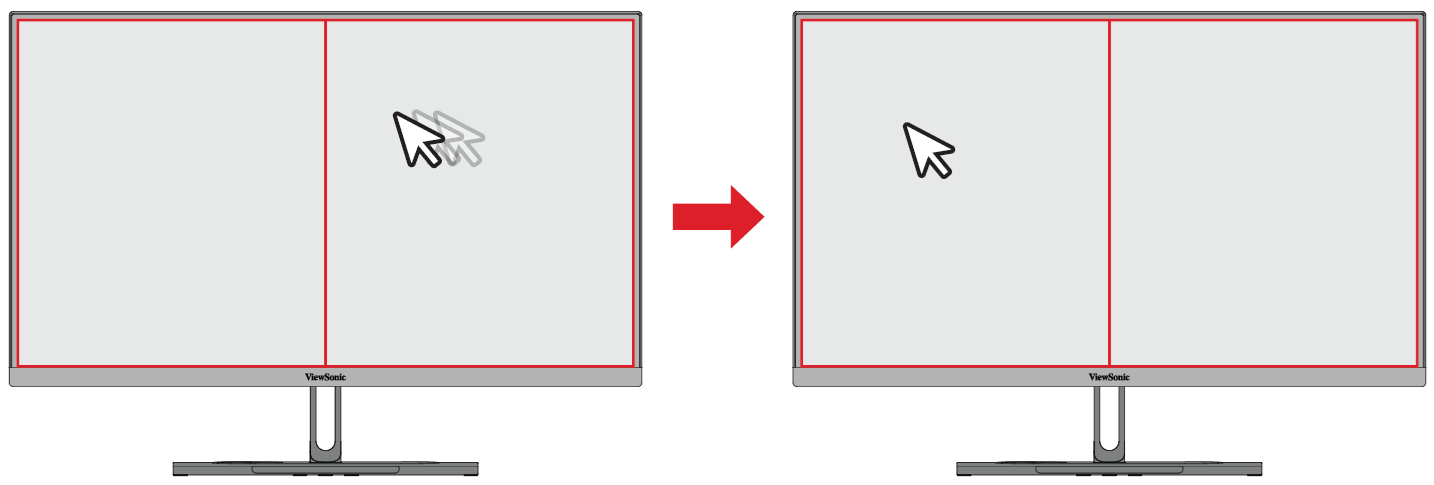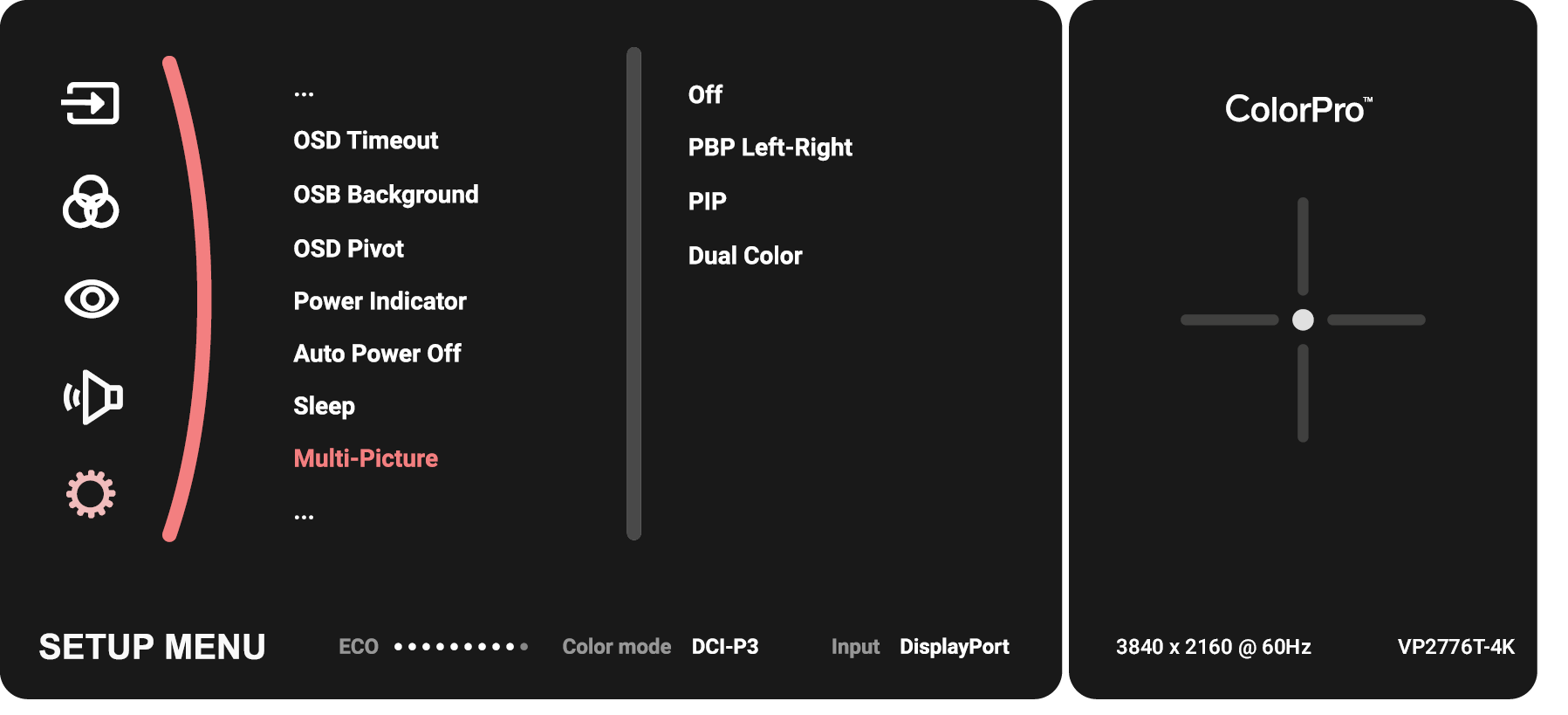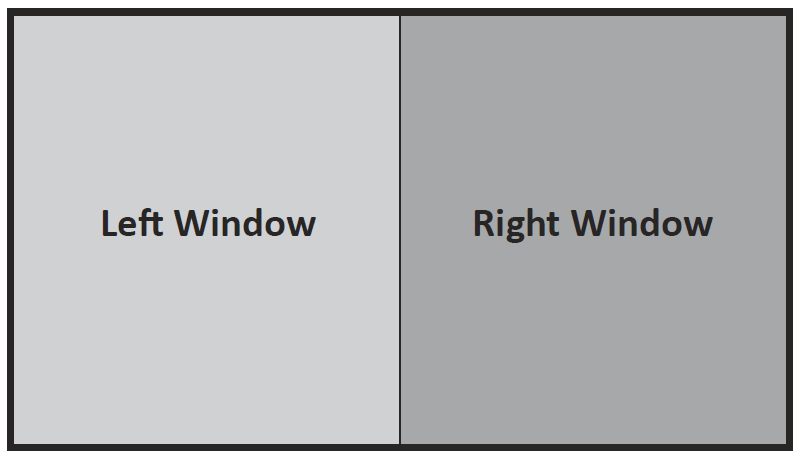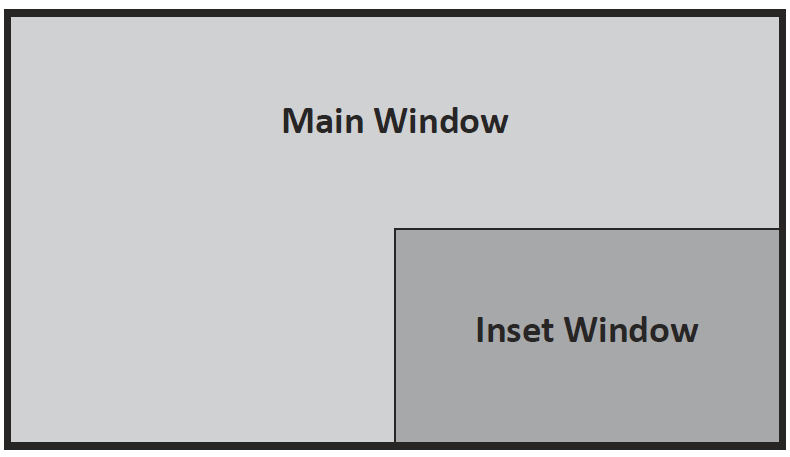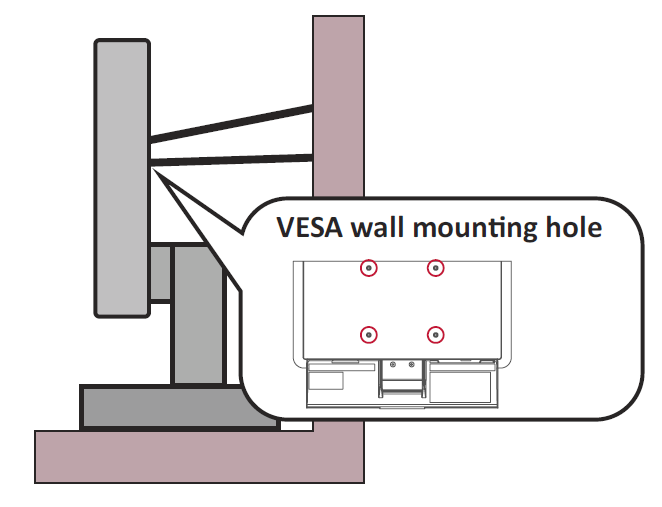
Package Contents
- Monitor
- Power Cord
- Video Cable
- Quick Start Guide
Note: The cables included in your package may vary depending on your country. Please contact your local reseller for more information.
Product Overview
| Number |
Description
|
| 1
|
Joy Key
|
| 2
|
Power Button
|
| 3
|
I/O Ports
|
| 4
|
Security Lock Slot
|
I/O Ports
| Number |
Description
|
| 1 |
AC IN
|
| 2 |
HDMI
|
| 3 |
DisplayPort
|
| 4 |
USB Type C
|
| 5 |
Audio Out
|
| 6 |
USB Upstream
|
| 7 |
USb Downstream
|
| 8 |
Micro USB
|
Note: For more information about the (

/

/

/

/

) key and its functions, refer to
Hot Keys.
Installing the Stand
- Place the monitor on a flat, stable surface with the screen facing down.
- Align and slide the upper hooks of the monitor stand into the stand mounting slots.
- Lift the monitor into its upright position on a flat, stable surface.
Note: For safety and to ensure optimal performance, please position the monitor on a flat, stable surface. Failure to do so may lead to the monitor falling, causing damage to the monitor itself and/or posing a risk of personal injury.
Removing the Stand and Mounting the Monitor
Refer to the table below for the standard dimensions for mounting kits.
Note: For use only with a UL certified mounting kit/bracket. To obtain a wall mounting kit or height adjustment base, contact ViewSonic® or your local dealer.
| Maximum Loading
|
Pad Hole
|
Screw Specification
|
Screw Quantity
|
| 14 kg
|
100 x 100 mm
|
M4 x 10 mm
|
4 screws
|
Note: Mounting kits are sold separately.
Important: Before removing the stand, turn off the monitor, disconnect all cables, and place the monitor on a flat, stable surface with the screen facing down.
- Press and hold the quick release tab and carefully lift the stand.
- Pull down slightly to disengage the hooks and remove the stand.
- Attach the mounting bracket to the VESA mounting holes at the rear of the monitor. Then secure it with four screws (M4 x 10 mm).
- Follow the instructions that come with the purchased or optional mounting kit to mount the monitor.
Using the Security Slot
To help prevent the monitor from being stolen, use a security slot locking device to secure the monitor to a fixed object.
Additionally, fastening the monitor to a wall or fixed object using a security cable can help support the weight of the monitor in order to prevent the monitor from falling over.
Connecting to Power
- Connect the power cord to the AC IN jack at the rear of the monitor.
- Plug the power cord plug into a power outlet.
Display Connection
HDMI
- Connect one end of an HDMI cable to an HDMI port of the monitor.
- Plug the other end of the cable into the HDMI port of your computer.
DisplayPort
- Connect one end of a DisplayPort cable to the DP port of the monitor.
- Plug the other end of the cable into the DisplayPort or Mini DisplayPort port of your computer.
Note: To connect the monitor to the Thunderbolt port (v. 1 & 2) on your Mac, connect the Mini DisplayPort end of a “Mini DisplayPort to DisplayPort cable” to the Thunderbolt output port of your Mac. Then connect the other end of the cable to the DisplayPort port of the monitor.
Type C
- Connect one end of a USB Type C cable to the Type C port of the monitor.
- Plug the other end of the cable into the USB Type C port of your computer.
Note: For video output use, make sure your USB Type C output device (e.g., laptop) and cable support video signal transmission.
USB Connection
The monitor supports two types of USB ports, upstream and downstream. When making connection(s), observe the following guideline.
| USB Type
|
Connection Type
|
Description
|

|
Upstream
|
Type B
|
Transfers data between the computer and the USB devices connected to the monitor.
|

|
Downstream
|
Type C
|
Transfers audio, video, and power. Enables the KVM function.
|
| Supports 5V/3A, 9V/3A, 12V/3A, 15V/3A, 20V/3.25A (LPS) charging.
|

|
Type A
|
For peripheral device(s) (e.g., storage device, keyboard, mouse, etc.).
|
| Supports 5V/2A charging.
|

|
Micro USB
|
For use with the ColorPro™ Wheel only.
|
Note: To use peripheral devices with the USB Type A ports, please also connect your computer to the monitor’s USB Type B port.
Using the USB Ports
- To use the downstream USB Type A ports, connect one end of the USB Type B cable to the upstream USB Type B port of the monitor. Plug the other end of the cable, USB Type A, into a USB port of your computer.
- Connect your peripheral device(s) to a downstream USB Type A port of the monitor.
Audio Connection
Plug the audio jack of the audio device into the Audio Out port of the monitor.
Note: The monitor is also equipped with dual speakers.
Adjusting the Viewing Angle
Height Adjustment
Lower or raise the monitor to the desired height (0 to 130 mm).
Note: When adjusting, press down firmly along the adjustment track holding the monitor with both hands on the side.
Screen Orientation Adjustment (Monitor Pivot)
- Adjust the monitor height to the highest position. Then tilt the monitor backwards to the full tilt position.
- Rotate the monitor 90° clockwise or counterclockwise (3) from landscape to portrait orientation.
Note:
- When adjusting, make sure to hold both sides of your monitor firmly with both hands.
- If using the Auto Pivot function, the system can detect the screen orientation automatically.
Swivel Adjustment
Swivel the monitor to the left or right for the desired viewing angle (60˚).
Tilt Adjustment
Tilt the monitor forwards or backwards to the desired viewing angle (-5˚ to 21˚).
Note: When adjusting, support the stand firmly with one hand while tilting the monitor forwards or backwards with the other hand.
Turning the Monitor On/Off
- Plug the connected power adapter into a power outlet.
- Press the Power ( ) button to turn on the monitor.
- To turn the monitor off, press the Power ( ) button again.
Note:
- If the OSD Menu is still on screen, press and hold the Power ( ) button for three seconds to power off.
- The monitor will still consume some power as long as the power cord is connected to the power outlet. If the monitor is not being used for a long period of time, please disconnect the power plug from the power outlet.
Using the Joy Key
Use the Joy Key to activate Hot Keys, navigate the On-Screen Display (OSD) Menu, and change settings.
Move the Joy Key (  ) to activate the Startup Menu.
) to activate the Startup Menu.
Note: Follow the key guide that appears on the screen to select the option or make adjustments.
Main Menu
Enter the On-Screen Display (OSD) Menu.
Color Mode
Select one of the preset standard color settings.
ViewMode
Select one of the preset display settings.
Brightness
Adjust the brightness level.
Input
Select the input source.
Volume
Adjust the volume settings.
Note: Move the
Joy Key (

) to return to the previous menu.
Hot Keys
When the On-Screen Display (OSD) Menu is off, you can quickly access special functions by using the Joy Key.
| Key
|
Description
|
|
|
Press and hold the key for five seconds to activate/deactivate LED lighting.
|
|
|
Press and hold the key to lock/unlock the OSD Menu.
When the menu appears on the screen, continue holding the key for 10 seconds to lock/unlock the OSD Menu.
If the OSD Menu is locked, the below message will appear on the screen:
|
|
|
Press and hold the key to lock/unlock the Power ( ) button.
When the menu appears on the screen, continue holding the key for 10 seconds to lock/unlock the Power ( ) button.
If the Power ( ) button is locked, the below message will appear on the screen.
|
|
|
Press and hold the key for 10 seconds to display/hide the boot up screen when the device is turned on.
|
|
|
Press and hold the key for 10 seconds to activate/deactivate Ultra Fast.
|
General Operations
- Move the Joy Key (
 ) to display the Startup Menu. Then navigate to Main Menu and press the Joy Key (
) to display the Startup Menu. Then navigate to Main Menu and press the Joy Key (  ) to display the OSD Menu.
) to display the OSD Menu.
- Move the Joy Key (
 ) or (
) or (  ) to select the main menu. Then press the Joy Key (
) to select the main menu. Then press the Joy Key (  ) to enter the selected menu.
) to enter the selected menu.
- Move the Joy Key (
 ) or (
) or (  ) to select the desired menu option. Then press the Joy Key (
) to select the desired menu option. Then press the Joy Key (  ) to enter the sub-menu.
) to enter the sub-menu.
- Move the Joy Key (
 ) or (
) or (  ) to adjust/select the setting. Then press the Joy Key (
) to adjust/select the setting. Then press the Joy Key (  ) to confirm.
) to confirm.
- Move the Joy Key (
 ) to return to the previous menu.
) to return to the previous menu.
On-Screen Display (OSD) Tree
| Sub-menu
|
Menu Option
|
| DisplayPort
|
Color Format
|
Auto
|
| RGB (Full Range)
|
| RGB (Limited Range)
|
| YUV (Full Range)
|
| YUV (Limited Range)
|
| DisplayPort 1.4
|
On
|
| Off
|
| HDMI 1
|
Color Format
|
Auto
|
| RGB (Full Range)
|
| RGB (Limited Range)
|
| YUV (Full Range)
|
| YUV (Limited Range)
|
| HDMI 2.0
|
On
|
| Off
|
| HDMI 2
|
Color Format
|
Auto
|
| RGB (Full Range)
|
| RGB (Limited Range)
|
| YUV (Full Range)
|
| YUV (Limited Range)
|
| HDMI 2.0
|
On
|
| Off
|
| Type C
|
Color Format
|
Auto
|
| RGB (Full Range)
|
| RGB (Limited Range)
|
| YUV (Full Range)
|
| YUV (Limited Range)
|
| USB 3.2
|
On
|
| Off
|
| DisplayPort 1.4
|
On
|
| Off
|
| Auto Detect
|
On
|
|
| Off
|
| Sub-menu
|
Menu Option
|
| Adobe RGB
|
Brightness
|
(-/+, 0~100)/1
|
|
| Color Temperature
|
9300K
|
| 7500K
|
| 6500K
|
| 6300K
|
| 5000K
|
| Gamma
|
1
|
| 1.4
|
| 1.8
|
| 2.2
|
| 2.4
|
| 2.6
|
| Sharpness
|
(-/+, 0~100)/1
|
| Aspect Ratio
|
1:1
|
| 4:3
|
| Full Screen
|
| Uniformity
|
On
|
| Off
|
| Recall
|
|
| DCI-P3
|
Brightness
|
(-/+, 0~100)/1
|
|
| Color Temperature
|
9300K
|
| 7500K
|
| 6500K
|
| 6300K
|
| 5000K
|
| Gamma
|
1
|
| 1.4
|
| 1.8
|
| 2.2
|
| 2.4
|
| 2.6
|
| Sharpness
|
(-/+, 0~100)/1
|
| Aspect Ratio
|
1:1
|
| 4:3
|
| Full Screen
|
| Uniformity
|
On
|
| Off
|
| Recall
|
|
| sRGB
|
Brightness
|
(-/+, 0~100)/1
|
|
| Color Temperature
|
9300K
|
| 7500K
|
| 6500K
|
| 6300K
|
| 5000K
|
| Gamma
|
1
|
| 1.4
|
| 1.8
|
| 2.2
|
| 2.4
|
| 2.6
|
| Sharpness
|
(-/+, 0~100)/1
|
| Aspect Ratio
|
1:1
|
| 4:3
|
| Full Screen
|
| Uniformity
|
On
|
| Off
|
| Recall
|
|
| REC709
|
Brightness
|
(-/+, 0~100)/1
|
|
| Color Temperature
|
9300K
|
| 7500K
|
| 6500K
|
| 6300K
|
| 5000K
|
| Gamma
|
1
|
| 1.4
|
| 1.8
|
| 2.2
|
| 2.4
|
| 2.6
|
| Sharpness
|
(-/+, 0~100)/1
|
| Aspect Ratio
|
1:1
|
| 4:3
|
| Full Screen
|
| Uniformity
|
On
|
| Off
|
| Recall
|
|
| DICOM-SIM
|
Sharpness
|
(-/+, 0~100)/1
|
|
| Aspect Ratio
|
1:1
|
| 4:3
|
| Full Screen
|
| Recall
|
|
| Soft Proofing
|
Contrast
|
(-/+, 0~100)/1
|
|
| Brightness
|
(-/+, 0~100)/1
|
| Color Temperature
|
9300K
|
| 7500K
|
| 6500K
|
| 6300K
|
| 5000K
|
| Gamma
|
1
|
| 1.4
|
| 1.8
|
| 2.2
|
| 2.4
|
| 2.6
|
| Sharpness
|
(-/+, 0~100)/1
|
| Aspect Ratio
|
1:1
|
| 4:3
|
| Full Screen
|
| Uniformity
|
On
|
| Off
|
| Recall
|
|
| User
|
Contrast
|
(-/+, 0~100)/1
|
|
| Brightness
|
(-/+, 0~100)/1
|
| Color Temperature
|
9300K
|
| 7500K
|
| 6500K
|
| 6300K
|
| 5000K
|
| Gamma
|
1
|
| 1.4
|
| 1.8
|
| 2.2
|
| 2.4
|
| 2.6
|
| Advanced DCR
|
(-/+, 0~100)/25
|
| Gain
|
Red
|
(-/+, 0~100)
|
| Green
|
(-/+, 0~100)
|
| Blue
|
(-/+, 0~100)
|
| Offset
|
Red
|
(-/+, 0~100)
|
| Green
|
(-/+, 0~100)
|
| Blue
|
(-/+, 0~100)
|
| Hue
|
Red
|
(-/+, 0~100)
|
| Green
|
(-/+, 0~100)
|
| Blue
|
(-/+, 0~100)
|
| Cyan
|
(-/+, 0~100)
|
| Magenta
|
(-/+, 0~100)
|
| Yellow
|
(-/+, 0~100)
|
| Sharpness
|
(-/+, 0~100)/1
|
|
| Aspect Ratio
|
1:1
|
| 4:3
|
| Full Screen
|
| Blue Light Filter
|
(-/+, 0~5)
|
| Uniformity
|
On
|
| Off
|
| Recall
|
|
| CAL1/CAL2/CAL3
|
Brightness
|
(-/+, 0~100)/1
|
|
| Color Calibration Notice
|
Result
|
| Remind Schedule Hour
|
| Counter Hour
|
| Recall
|
| Sharpness
|
(-/+, 0~100)/1
|
| Aspect Ratio
|
1:1
|
| 4:3
|
| Full Screen
|
| Uniformity
|
On
|
| Off
|
| Recall
|
|
| HDR
|
Standard
|
|
| HDR_M
|
| HDR_H
|
| Smooth
|
| Off
|
| Sub-menu
|
Menu Option
|
| CAD/CAM
|
Ultra Clear
|
(-/+, 0~4)
|
| Advanced-Sharpness
|
(-/+, 0~100)
|
| Advanced-Gamma
|
(-/+, 1.8~2.6)
|
| Video Edit
|
Ultra Clear
|
(-/+, 0~4)
|
| Advanced-Sharpness
|
(-/+, 0~100)
|
| Advanced-Gamma
|
(-/+, 1.8~2.6)
|
| Animation
|
Ultra Clear
|
(-/+, 0~4)
|
| Advanced-Sharpness
|
(-/+, 0~100)
|
| Black Stabilization
|
(-/+, 0~10)
|
| Photographer
|
Ultra Clear
|
(-/+, 0~4)
|
| Advaned-Sharpness
|
(-/+, 0~100)
|
| Advanced-Gamma
|
(-/+, 1.8~2.6)
|
| FPS 1
|
|
| FPS 2
|
| RTS
|
| MOBA
|
| Sub-menu
|
Menu Option
|
| Volume
|
(-/+, 0~100)/1
|
| Mute
|
On
|
| Off
|
| Audio Input
|
DisplayPort
|
| HDMI 1
|
| HDMI 2
|
| Type C
|
| Sub-menu
|
Menu Option
|
| Language Select
|
English
|
|
| Français
|
| Deutsch
|
| Español
|
| Italiano
|
| Suomi
|
| Русский
|
| Türkçe
|
| 日本語
|
| 한국어
|
| 繁體中文
|
| 简体中文
|
| Resolution Notice
|
On
|
|
| Off
|
| Information
|
|
|
| OSD Timeout
|
(-/+, 5/15/30/60)
|
| OSD Background
|
On
|
|
| Off
|
| OSD Pivot
|
Auto
|
|
| 0°
|
| +90°
|
| -90°
|
| 180°
|
| Power Indicator
|
On
|
|
| Off
|
| Auto Power Off
|
On
|
|
| Off
|
| Sleep
|
30 minutes
|
|
| 45 minutes
|
| 60 minutes
|
| 120 minutes
|
| Off
|
| Multi-Picture
|
Off
|
|
|
| PBP Left-Right
|
Left Source Select
|
DisplayPort
|
| HDMI 1
|
| HDMI 2
|
| Type C
|
| Right Source Select
|
DisplayPort
|
| HDMI 1
|
| HDMI 2
|
| Type C
|
| Swap
|
|
| PIP
|
PIP Source Select
|
DisplayPort
|
| HDMI 1
|
| HDMI 2
|
| Type C
|
| PIP Position
|
PIP H. Position
|
| PIP V. Position
|
| PIP Size
|
(-/+, 0~100)
|
| Swap
|
|
| Dual Color
|
DCI-P3
|
|
| sRGB
|
| REC709
|
| DICOM-SIM
|
| User
|
| CAL 1
|
| CAL 2
|
| CAL 3
|
| CAD/CAM
|
| Video Edit
|
| Animation
|
| Photographer
|
| FPS 1
|
| FPS 2
|
| RTS
|
| MOBA
|
| ECO Mode
|
Standard
|
|
| Optimize
|
| Conserve
|
| Energy Saving
|
On
|
|
| Off
|
| Overscan
|
On
|
|
| Off
|
| Response Time
|
Standard
|
|
| Advanced
|
| Ultra Fast
|
| USB Charging
|
On
|
|
| Off
|
| Backstage Lighting
|
Level 1
|
|
| Level 2
|
| Level 3
|
| Off
|
| Burn-in Eraser
|
On
|
|
| Off
|
| DDC/CI
|
On
|
|
| Off
|
| Rename
|
|
|
| All Recall
|
|
Input
- Move the Joy Key (
 ) to display the Startup Menu. Then navigate to Main Menu and press the Joy Key (
) to display the Startup Menu. Then navigate to Main Menu and press the Joy Key (  ) to display the OSD Menu.
) to display the OSD Menu.
- Move the Joy Key (
 ) or (
) or (  ) to select Input. Then press the Joy Key (
) to select Input. Then press the Joy Key (  ) to enter the Input menu.
) to enter the Input menu.
- Move the Joy Key (
 ) or (
) or (  ) to select the desired input source. Then press the Joy Key (
) to select the desired input source. Then press the Joy Key (  ) to confirm the selection.
) to confirm the selection.
Color Mode
- Move the Joy Key (
 ) to display the Startup Menu. Then navigate to Main Menu and press the Joy Key (
) to display the Startup Menu. Then navigate to Main Menu and press the Joy Key (  to display the OSD Menu.
to display the OSD Menu.
- Move the Joy Key (
 ) or (
) or (  ) to select Color Mode. Then press the Joy Key (
) to select Color Mode. Then press the Joy Key (  ) to enter the Color Mode menu.
) to enter the Color Mode menu.
- Move the Joy Key (
 ) or (
) or (  ) to select the desired option. Then press the Joy Key (
) to select the desired option. Then press the Joy Key (  ) to enter its sub-menu.
) to enter its sub-menu.
- Move the Joy Key (
 ) or (
) or (  ) to adjust/select the setting, and press the Joy Key (
) to adjust/select the setting, and press the Joy Key (  ) to confirm the selection (if applicable).
) to confirm the selection (if applicable).
| Menu Option
|
Description
|
| Adobe RGB
|
Precise color gamut and gamma of Adobe RGB standard.
|
| DCI-P3
|
Precise color gamut and gamma of DCI-P3 standard.
|
| sRGB
|
Precise color gamut and gamma of sRGB standard.
|
| REC709
|
Precise color gamut and gamma of ITU-R Rec. 709 standard.
|
| DICOM-SIM
|
Gamma curves are set to a DICOM simulation.
|
| User
|
Custom, user-defined settings.
|
| CAL1/CAL2/CAL3
|
Display with the 1st/2nd/3rd user calibration mode.
|
| HDR
|
Reduce the overall contrast of a given scene so that detail in the highlights and shadows can be seen.
|
ViewMode
- Move the Joy Key (
 ) to display the Startup Menu. Then navigate to Main Menu and press the Joy Key (
) to display the Startup Menu. Then navigate to Main Menu and press the Joy Key (  ) to display the OSD Menu.
) to display the OSD Menu.
- Move the Joy Key (
 ) or (
) or (  ) to select ViewMode. Then press the Joy Key (
) to select ViewMode. Then press the Joy Key (  ) to enter the ViewMode menu.
) to enter the ViewMode menu.
- Move the Joy Key (
 ) or (
) or (  ) to select the desired option. Then press the Joy Key (
) to select the desired option. Then press the Joy Key (  ) to enter its sub-menu.
) to enter its sub-menu.
| Menu Option
|
Description
|
| CAD/CAM
|
Select this option for viewing graphic design files.
|
| Video Edit
|
Select this option for video editing.
|
| Animation
|
Select this option for animation.
|
| Photographer
|
Select this option for viewing photo files.
|
| FPS 1
|
Ideal for First-Person Shooter games.
|
| FPS 2
|
Ideal for First-Person Shooter games.
|
| RTS
|
Ideal for Real-Time Strategy games.
|
| MOBA
|
Select this option for Multiplayer Online Battle Arena games.
|
Audio Adjust
- Move the Joy Key (
 ) to display the Startup Menu. Then navigate to Main Menu and press the Joy Key (
) to display the Startup Menu. Then navigate to Main Menu and press the Joy Key (  ) to display the OSD Menu.
) to display the OSD Menu.
- Move the Joy Key (
 ) or (
) or (  ) to select Audio Adjust. Then press the Joy Key (
) to select Audio Adjust. Then press the Joy Key (  ) to enter the Audio Adjust menu.
) to enter the Audio Adjust menu.
- Move the Joy Key (
 ) or (
) or (  ) to select the desired option. Then press the Joy Key (
) to select the desired option. Then press the Joy Key (  ) to enter its sub-menu.
) to enter its sub-menu.
- Move the Joy Key (
 ) or (
) or (  ) to adjust/select the setting, and press the Joy Key (
) to adjust/select the setting, and press the Joy Key (  ) to confirm the selection (if applicable).
) to confirm the selection (if applicable).
| Menu Option
|
Description
|
| Volume
|
Adjust the monitor’s sound level.
|
| Mute
|
Turn off the monitor's sound.
|
| Audio Input
|
Select the audio input source.
|
- Move the Joy Key (
 ) to display the Startup Menu. Then navigate to Main Menu and press the Joy Key (
) to display the Startup Menu. Then navigate to Main Menu and press the Joy Key (  ) to display the OSD Menu.
) to display the OSD Menu.
- Move the Joy Key (
 ) or (
) or (  ) to select Setup Menu. Then press the Joy Key (
) to select Setup Menu. Then press the Joy Key (  ) to enter the Setup Menu menu.
) to enter the Setup Menu menu.
- Move the Joy Key (
 ) or (
) or (  ) to select the desired option. Then press the Joy Key (
) to select the desired option. Then press the Joy Key (  ) to enter its sub-menu.
) to enter its sub-menu.
- Move the Joy Key (
 ) or (
) or (  ) to adjust/select the setting, and press the Joy Key (
) to adjust/select the setting, and press the Joy Key (  ) to confirm the selection (if applicable).
) to confirm the selection (if applicable).
| Menu Option
|
Description
|
| Language Select
|
Select an available language for the OSD Menu.
|
| Adaptive Sync
|
Eliminates stuttering and tearing during gameplay.
|
| Resolution Notice
|
Enable this option to allow the system to inform users that the current viewing resolution is not the correct native resolution.
|
| PureXP™
|
Short for “Pure Experience”, this feature can enhance the visual quality of moving objects, making them less vague with a clearer view.
|
| Information
|
Display the monitor information.
|
| OSD Timeout
|
Set the length of time the OSD Menu remains on screen.
|
| OSD Background
|
Show/Hide the OSD background when the OSD Menu appears on the screen.
|
| OSD Pivot
|
Set the OSD Menu orientation.
- Auto: With the built-in G sensor, the OSD Menu can automatically pivot when the monitor is positioned vertically.
-
- 0°: Sets the OSD Menu without a pivot.
-
- +90°: Sets the OSD Menu with a +90° pivot.
-
- 90°: Sets the OSD Menu with a -90° pivot.
-
- 180°: Sets the OSD Menu with a 180° pivot.
-
|
| Power Indicator
|
Set the Power Indicator On or Off. If the setting is set to On, the power indicator lights blue when the device is turned on.
|
| Auto Power Off
|
Enable this option to allow the monitor to automatically turn off after a certain amount of time.
|
| Sleep
|
Set the amount of idle time before the monitor enters Sleep mode.
|
| Multi-Picture
|
Off
- Disable this function.
PBP Left-Right
- Display two windows, a 1x1 split screen, side-by-side on the left and right of the screen. User can specify the input source for each screen.
PIP
- Split the screen into two parts, a main window and an inset window. User can specify the input source for each screen.
Dual Color
- Display two different color settings in PIP or PBP mode.
|
| ECO Mode
|
Choose between various modes, based on power consumption.
|
| Overscan
|
Enable this option to automatically enlarge the original picture horizontally and vertically to an equal aspect ratio that fills the screen.
|
| Response Time
|
Adjust the response time, creating smooth images without streaking, blurring or ghosting. A low response time is perfect for the most graphic-intense gaming, and provides amazing visual quality while watching sports or action movies.
|
| USB Charging
|
Enable/disable usb charging.
|
| Backstage Lighting
|
Adjust the LED lighting.
|
| Burn-in Eraser
|
Reduce image burn-in.
|
| DDC/CI
|
Enable this option to allow the monitor control via the graphics card.
|
| Rename
|
Rename the personalized custom profile.
|
| All Recall
|
Resets all settings to their default values.
|
Auto Pivot
With the Auto Pivot function, the monitor can detect the image display and adjust the image’s orientation on the screen automatically when pivoting the screen vertically or horizontally.
Note: The Auto Pivot function uses DDC/CI to communicate with the monitor. Before applying the Auto Pivot function, please make sure the DDC/CI setting is set to On.
To enable the DDC/CI setting:
- Open the OSD Menu and select the Setup Menu menu. Then press the Joy Key (
 ) to enter the menu.
) to enter the menu.
- Move the Joy Key (
 ) or (
) or (  ) to select DDC/CI. Then press the Joy Key (
) to select DDC/CI. Then press the Joy Key (  ) to enter its sub-menu.
) to enter its sub-menu.
Move the Joy Key (  ) or (
) or (  ) to select On. Then press the Joy Key (
) to select On. Then press the Joy Key (  ) to confirm.
) to confirm.
After making sure DDC/CI is On, proceed to set OSD Pivot to Auto:
- Open the OSD Menu and select the Setup Menu menu. Then press the Joy Key (
 ) to enter the menu.
) to enter the menu.
- Move the Joy Key (
 ) or (
) or (  ) to select OSD Pivot. Then press the Joy Key (
) to select OSD Pivot. Then press the Joy Key (  ) to enter its sub-menu.
) to enter its sub-menu.
- Move the Joy Key (
 ) or (
) or (  ) to select Auto. Then press the Joy Key (
) to select Auto. Then press the Joy Key (  ) to confirm.
) to confirm.
Backstage Lighting
With the Backstage Lighting function, the monitor can adjust the LED brightness to the optimal settings.
To configure the Backstage Lighting settings:
- Open the OSD Menu and select the Setup Menu menu. Then press the Joy Key (
 ) to enter the menu.
) to enter the menu.
- Move the Joy Key (
 ) or (
) or (  ) to select Backstage Lighting. Then press the Joy Key (
) to select Backstage Lighting. Then press the Joy Key (  ) to enter its sub-menu.
) to enter its sub-menu.
- Move the Joy Key (
 ) or (
) or (  ) to select Level 1, Level 2, or Level 3 to enable the function. Then press the Joy Key (
) to select Level 1, Level 2, or Level 3 to enable the function. Then press the Joy Key (  ) to confirm.
) to confirm.
Colorbration+
To ensure long-term color accuracy, some specific models support the hardware color calibration function. The Colorbration+ application installation file can be found at our website.
Standard monitor packing does not include the color sensor, which the Colorbration+ application needs for the calibration process.
Compatible color sensors include:
- X-Rite i1 Display Pro
- X-Rite i1 Pro 2
- X-Rite i1 Studio
- Xrite Colormunki Photo
- Xrite Colormunki Design
- Datacolor SpyderX series
- ColorPro™ Wheel
Dual Color
The monitor comes with a dual color engine to display two different color settings in PIP (Picture-in-Picture) or PBP (Picture-by-Picture) mode. You can set different color presets in both windows (The Main Window and Secondary Window).
Note: To enable PIP or PBP mode, refer to the
Multi-Picture section.
To configure Dual Color:
- Move the Joy Key (
 ) to display the Startup Menu. Then navigate to Main Menu and press the Joy Key (
) to display the Startup Menu. Then navigate to Main Menu and press the Joy Key (  ) to display the OSD Menu.
) to display the OSD Menu.
- Move the Joy Key (
 ) or (
) or (  ) to select the Setup Menu menu. Then press the Joy Key (
) to select the Setup Menu menu. Then press the Joy Key (  ) to enter the menu.
) to enter the menu.
- Move the Joy Key (
 ) or (
) or (  ) to select Multi-Picture. Then press the Joy Key (
) to select Multi-Picture. Then press the Joy Key (  ) to enter its sub-menu.
) to enter its sub-menu.
- Move the Joy Key (
 ) or (
) or (  ) to select Dual Color. Then press the Joy Key (
) to select Dual Color. Then press the Joy Key (  ) to enter its sub-menu.
) to enter its sub-menu.
- Move the Joy Key (
 ) or (
) or (  ) to select the desired color setting. Then press the Joy Key (
) to select the desired color setting. Then press the Joy Key (  ) to confirm.
) to confirm.
Firmware Update
For the best display performance and to resolve any known issues, it is best to keep your monitor updated with the latest firmware version. With the supplied USB cable and the vDisplayManager application, you can easily update your monitor’s firmware.
To update the firmware:
- Download and install the vDisplayManager application from our website.
- Connect one end of a USB Type B cable to the USB Type B port of the monitor. Then connect the other end of the cable to a USB port of the computer.
- Launch vDisplayManager. Select the Advanced tab in the side menu.
- Click Update to check for any updates to your monitor’s firmware.
- Wait until the update process is complete (if applicable).
Note: Any interruptions during the firmware update process may permanently damage your monitor. Do not disconnect the USB cable or turn off your PC and monitor.
HDR (High-Dynamic-Range)
HDR reduces the overall contrast of a given scene so that detail in the highlights and shadows can be better seen.
Note: Please make sure the HDR setting is turned on on your device first before enabling HDR on the monitor.
To enable the HDR function:
- Move the Joy Key (
 ) to display the Startup Menu. Then navigate to Main Menu and press the Joy Key (
) to display the Startup Menu. Then navigate to Main Menu and press the Joy Key (  ) to display the OSD Menu.
) to display the OSD Menu.
- Move the Joy Key (
 ) or (
) or (  ) to select Color Mode. Then press the Joy Key (
) to select Color Mode. Then press the Joy Key (  ) to enter the Color Mode menu.
) to enter the Color Mode menu.
- Move the Joy Key (
 ) or (
) or (  ) to select HDR. Then press the Joy Key (
) to select HDR. Then press the Joy Key (  ) to enter its sub-menu.
) to enter its sub-menu.
- Move the Joy Key (
 ) or (
) or (  ) to select one of the options . Then press the Joy Key (
) to select one of the options . Then press the Joy Key (  ) to confirm.
) to confirm.
KVM
The KVM function allows the user to control two computers connected to the same monitor from a single keyboard and mouse.
Note: Only applicable in PBP (Picture-by-Picture) mode.
To connect the two computers to the monitor:
- Connect one end of a USB Type C cable to the USB Type C port of the monitor. Then connect the other end of the cable to the USB Type C port of the laptop.
- Connect one end of a DisplayPort cable to the DisplayPort port of the monitor. Then connect the other end of the cable to the DisplayPort or Mini DisplayPort of the computer.
- Connect one end of a USB Type B cable to the USB Type B port of the monitor. Then connect the other end of the cable to a USB port of the computer.
To enable PBP mode:
- Move the Joy Key (
 ) to display the Startup Menu. Then navigate to Main Menu and press the Joy Key (
) to display the Startup Menu. Then navigate to Main Menu and press the Joy Key (  ) to display the OSD Menu.
) to display the OSD Menu.
- Move the Joy Key (
 ) or (
) or (  ) to select the Setup Menu menu. Then press the Joy Key (
) to select the Setup Menu menu. Then press the Joy Key (  ) to enter the menu.
) to enter the menu.
- Move the Joy Key (
 ) or (
) or (  ) to select Multi-Picture. Then press the Joy Key (
) to select Multi-Picture. Then press the Joy Key (  ) to enter its sub-menu.
) to enter its sub-menu.
- Move the Joy Key (
 ) or (
) or (  ) to select PBP Left-Right. Then press the Joy Key (
) to select PBP Left-Right. Then press the Joy Key (  ) to enable PBP mode.
) to enable PBP mode.
To activate the KVM function:
- Move and hold the Joy Key (
 ) for two seconds to activate the KVM function.
) for two seconds to activate the KVM function.
- Then you will be able to switch the cursor between the two screens (left/right window).
Multi-Picture
Multi-Picture allows users to further customize their work space by allowing up to four split windows from different inputs, displaying high resolution content with different aspect ratios, without distortion from the original input sources.
To enable Multi-Picture mode:
- Move the Joy Key (
 ) to display the Startup Menu. Then navigate to Main Menu and press the Joy Key (
) to display the Startup Menu. Then navigate to Main Menu and press the Joy Key (  ) to display the OSD Menu.
) to display the OSD Menu.
- Move the Joy Key (
 ) or (
) or (  ) to select Color Mode. Then press the Joy Key (
) to select Color Mode. Then press the Joy Key (  ) to enter the Color Mode menu.
) to enter the Color Mode menu.
- Move the Joy Key (
 ) or (
) or (  ) to select Multi-Picture. Then press the Joy Key (
) to select Multi-Picture. Then press the Joy Key (  ) to enter its sub-menu.
) to enter its sub-menu.
- Move the Joy Key (
 ) or (
) or (  ) to select PBP Left-Right or PIP. Then press the Joy Key (
) to select PBP Left-Right or PIP. Then press the Joy Key (  ) to enter the selected mode.
) to enter the selected mode.
PBP (Picture-by-Picture)
Note: To display full-sized images in the windows, please adjust the screen resolution to 1920 x 1080 (PBP Left-Right).
To configure PBP:
- Move the Joy Key (
 ) to display the Startup Menu. Then navigate to Main Menu and press the Joy Key (
) to display the Startup Menu. Then navigate to Main Menu and press the Joy Key (  ) to display the OSD Menu.
) to display the OSD Menu.
- Move the Joy Key (
 ) or (
) or (  ) to select Setup Menu. Then press the Joy Key (
) to select Setup Menu. Then press the Joy Key (  ) to enter the Setup Menu menu.
) to enter the Setup Menu menu.
- Move the Joy Key (
 ) or (
) or (  ) to select Multi-Picture. Then press the Joy Key (
) to select Multi-Picture. Then press the Joy Key (  ) to enter its sub-menu.
) to enter its sub-menu.
- Move the Joy Key (
 ) or (
) or (  ) to select PBP Left-Right. Then press the Joy Key (
) to select PBP Left-Right. Then press the Joy Key (  ) to enter its sub-menu.
) to enter its sub-menu.
- To change the input source, select the source location (Left Source Select/Right Source Select) and press the Joy Key (
 ).
).
- Move the Joy Key (
 ) or (
) or (  ) to select the desired input source and press the Joy Key (
) to select the desired input source and press the Joy Key (  ) to confirm.
) to confirm.
- To swap the two windows, select Swap and press the Joy Key (
 ) to confirm.
) to confirm.
PIP (Picture-in-Picture)
To configure PIP:
- Move the Joy Key (
 ) to display the Startup Menu. Then navigate to Main Menu and press the Joy Key (
) to display the Startup Menu. Then navigate to Main Menu and press the Joy Key (  ) to display the OSD Menu.
) to display the OSD Menu.
- Move the Joy Key (
 ) or (
) or (  ) to select Setup Menu. Then press the Joy Key (
) to select Setup Menu. Then press the Joy Key (  ) to enter the Setup Menu menu.
) to enter the Setup Menu menu.
- Move the Joy Key (
 ) or (
) or (  ) to select Multi-Picture. Then press the Joy Key (
) to select Multi-Picture. Then press the Joy Key (  ) to enter its sub-menu.
) to enter its sub-menu.
- Move the Joy Key (
 ) or (
) or (  ) to select PIP. Then press the Joy Key (
) to select PIP. Then press the Joy Key (  ) to enter its sub-menu.
) to enter its sub-menu.
- To change the input source for the Inset Window, select PIP Source Select and press the Joy Key (
 ). Then move the Joy Key (
). Then move the Joy Key (  ) or (
) or (  ) to select the desired input source and press the Joy Key (
) to select the desired input source and press the Joy Key (  ) to confirm.
) to confirm.
- To adjust the Inset Window position, select PIP Position and press the Joy Key (
 ).
).
- Press the Joy Key (
 ) to select PIP H.Position or PIP V.Position.
) to select PIP H.Position or PIP V.Position.
- Move the Joy Key (
 ) or (
) or (  ) to adjust the setting and press the Joy Key (
) to adjust the setting and press the Joy Key (  ) to confirm.
) to confirm.
- To adjust the Inset Window size, select PIP Size and press the Joy Key (
 ). Then move the Joy Key (
). Then move the Joy Key (  ) or (
) or (  ) to adjust the setting.
) to adjust the setting.
- To swap the two windows, select Swap and press the Joy Key (
 ) to confirm.
) to confirm.
Technical Specifications
| Item
|
Category
|
Specifications
|
| LCD
|
Type
|
IPS type, a-si TFT Active Matrix 3840 x 2160 LCD, 0.1554 (H) mm x 0.1554 (V) mm pixel pitch
|
| Display Size
|
68.47 cm
|
| 27" viewable
|
| Color Filter
|
RGB Vertical Stripe
|
| Glass Surface
|
Anti-Glare (Haze 25%), Hard Coating (3H)
|
| Input Signal
|
Video Sync
|
TMDS digital (100 Ω)
- DisplayPort (v. 1.4a): fh: 15~240 kHz, fv: 24~75 Hz
- HDMI (v. 2.0): fh: 15~240 kHz, fv: 24~75 Hz
- Type C: fh: 15~240 kHz, fv: 24~75 Hz
|
| Compatibility
|
PC
|
up to 3840 x 2160
|
| Macintosh
|
up to 3840 x 2160
|
| Resolution and Timings[1]
|
Recommended
|
3840 x 2160 @ 60 Hz
|
| Supported
|
- 4096 x 2160 @ 24, 25, 30, 50, 60 Hz
- 3840 x 2160 @ 24, 25, 30, 60 Hz
- 3840 x 1080 @ 60 Hz
- 2560 x 1440 @ 60 Hz
- 2048 x 1152 @ 60 Hz
- 1920 x 1440 @ 60 Hz
- 1920 x 1200 @ 60 Hz
- 1920 x 1080 @ 50, 60 Hz
- 1680 x 1050 @ 60 Hz
- 1600 x 1200 @ 60 Hz
- 1600 x 900 @ 60 Hz
- 1440 x 900 @ 60, 75 Hz
- 1400 x 1050 @ 60, 75 Hz
- 1366 x 768 @ 60 Hz
- 1360 x 768 @ 60 Hz
- 1280 x 1024 @ 50, 60, 75 Hz
- 1280 x 960 @ 50, 60, 75 Hz
- 1280 x 800 @ 60 Hz
- 1280 x 768 @ 50, 60 Hz
- 1280 x 720 @ 50, 60 Hz
- 1152 x 900 @ 67 Hz
- 1152 x 864 @ 75 Hz
- 1024 x 768 @ 50, 60, 70, 72, 75 Hz
- 848 x 480 @ 60 Hz
- 800 x 600 @ 56, 60, 72 Hz
- 720 x 576 @ 50 Hz
- 720 x 480 @ 60 Hz
- 720 x 400 @ 70 Hz
- 640 x 480 @ 50, 60, 67, 72 Hz
- 640 x 400 @ 60, 70 Hz
- 640 x 350 @ 70 Hz
|
| Power[2]
|
Input Voltage
|
AC 100-240V, 50/60 Hz (auto switch)
|
| Display Area
|
Active Size
(H x V)
|
596.74 x 335.66 mm
|
| 23.49” x 13.21”
|
| Operating Conditons
|
Altitude
|
3.048 km
|
| 10,000 ft
|
| Relative Humidity
|
20% to 90% (non-condensing)
|
| Temperature
|
0° C to 40° C
|
| 32° F to 104° F
|
| Storage Conditions
|
Altitude
|
12 km
|
| 39,370.1 ft
|
| Relative Humidity
|
5% to 90% (non-condensing)
|
| Temperature
|
-20° C to 60° C
|
| -4° F to 140° F
|
| Dimensions
(with stand)
|
Physical
(W x H x D)
|
613.10 x 569.11~449.11 x 232.4 mm
|
| 24.14” x 22.41~17.68” x 9.15”
|
| Weight
(with stand)
|
Physical
|
8.23 kg
|
| 18.15 lb
|
| Wall Mount
|
Dimensions
|
100 x 100 mm
|
| Power Consumption
|
On[3]
|
45W (Typical) without Audio
74W (Maximum) with Audio
|
| Off
|
< 0.3W (Maximum)
|
- ↑ Do not set the graphics card in your computer to exceed these timing modes; doing so may result in permanent damage to the display.
- ↑ Please use the power adapter from ViewSonic® or an authorized source only.
- ↑ The test condition follows EEI standards.
|
|
The terms HDMI, HDMI High-Definition Multimedia Interface, HDMI trade dress and the HDMI Logos are trademarks or registered trademarks of HDMI Licensing Administrator, Inc.
|
Compliance Information
This section addresses all connected requirements and statements regarding regulations. Confirmed corresponding applications shall refer to nameplate labels and relevant markings on the unit.
FCC Compliance Statement
This device complies with part 15 of FCC Rules. Operation is subject to the following two conditions: (1) this device may not cause harmful interference, and (2) this device must accept any interference received, including interference that may cause undesired operation. This equipment has been tested and found to comply with the limits for a Class B digital device, pursuant to part 15 of the FCC Rules.
These limits are designed to provide reasonable protection against harmful interference in a residential installation. This equipment generates, uses, and can radiate radio frequency energy, and if not installed and used in accordance with the instructions, may cause harmful interference to radio communications. However, there is no guarantee that interference will not occur in a particular installation. If this equipment does cause harmful interference to radio or television reception, which can be determined by turning the equipment off and on, the user is encouraged to try to correct the interference by one or more of the following measures:
- Reorient or relocate the receiving antenna.
- Increase the separation between the equipment and receiver.
- Connect the equipment into an outlet on a circuit different from that to which the receiver is connected.
- Consult the dealer or an experienced radio/TV technician for help.
Warning: You are cautioned that changes or modifications not expressly approved by the party responsible for compliance could void your authority to operate the equipment.
Industry Canada Statement
CAN ICES (B) / NMB (B)
CE Conformity for European Countries
|
|
The device complies with the EMC Directive 2014/30/EU and Low Voltage Directive 2014/35/EU.
|
The following information is only for EU-member states:
| The mark shown to the right is in compliance with the Waste Electrical and Electronic Equipment Directive 2012/19/EU (WEEE). The mark indicates the requirement NOT to dispose of the equipment as unsorted municipal waste, but use the return and collection systems according to local law.
|
|
Declaration of RoHS2 Compliance
This product has been designed and manufactured in compliance with Directive 2011/65/EU of the European Parliament and the Council on restriction of the use of certain hazardous substances in electrical and electronic equipment (RoHS2 Directive) and is deemed to comply with the maximum concentration values issued by the European Technical Adaptation Committee (TAC) as shown below:
| Substance
|
Proposed Maximum Concentration
|
Actual Concentration
|
| Lead (Pb)
|
0.1%
|
< 0.1%
|
| Mercury (Hg)
|
0.1%
|
< 0.1%
|
| Cadmium (Cd)
|
0.01%
|
< 0.01%
|
| Hexavalent Chromium (Cr6⁺)
|
0.1%
|
< 0.1%
|
| Polybrominated biphenyls (PBB)
|
0.1%
|
< 0.1%
|
| Polybrominated diphenyl ethers (PBDE)
|
0.1%
|
< 0.1%
|
| Bis (2-ethylhexyl) phthalate (DEHP)
|
0.1%
|
< 0.1%
|
| Butyl benzyl phthalate (BBP)
|
0.1%
|
< 0.1%
|
| Dibutyl phthalate (DBP)
|
0.1%
|
< 0.1%
|
| Diisobutyl phthalate (DIBP)
|
0.1%
|
< 0.1%
|
Certain components of products as stated above are exempted under the Annex III of the RoHS2 Directives as noted below. Examples of exempted components are:
- Copper alloy containing up to 4% lead by weight.
- Lead in high melting temperature type solders (i.e. lead-based alloys containing 85% by weight or more lead).
- Electrical and electronic components containing lead in a glass or ceramic other than dielectric ceramic in capacitors, e.g. piezoelectronic devices, or in a glass or ceramic matrix compound.
- Lead in dielectric ceramic in capacitors for a rated voltage of 125V AC or 250V DC or higher.
Indian Restriction of Hazardous Substances
Restriction on Hazardous Substances statement (India). This product complies with the “India E-waste Rule 2011” and prohibits use of lead, mercury, hexavalent chromium, polybrominated biphenyls or polybrominated diphenyl ethers in concentrations exceeding 0.1 weight % and 0.01 weight % for cadmium, except for the exemptions set in Schedule 2 of the Rule.
Product Disposal at End of Product Life
ViewSonic® respects the environment and is committed to working and living green. Thank you for being part of Smarter, Greener Computing. Please visit the ViewSonic® website to learn more.
USA & Canada
https://www.viewsonic.com/us/go-green-with-viewsonic
Europe
https://www.viewsonic.com/eu/environmental-social-governance/recycle
Taiwan
https://recycle.moenv.gov.tw
For EU users, please contact us for any safety/accident issue experienced with this product:
Copyright Information
Copyright© ViewSonic® Corporation, 2024. All rights reserved.
Macintosh and Power Macintosh are registered trademarks of Apple Inc.
Microsoft, Windows, and the Windows logo are registered trademarks of Microsoft Corporation in the United States and other countries.
ViewSonic® and the three birds logo are registered trademarks of ViewSonic® Corporation.
VESA is a registered trademark of the Video Electronics Standards Association. DPMS, DisplayPort, and DDC are trademarks of VESA.
ENERGY STAR® is a registered trademark of the U.S. Environmental Protection Agency (EPA).
As an ENERGY STAR® partner, ViewSonic® Corporation has determined that this product meets the ENERGY STAR® guidelines for energy efficiency.
Disclaimer: ViewSonic® Corporation shall not be liable for technical or editorial errors or omissions contained herein; nor for incidental or consequential damages resulting from furnishing this material, or the performance or use of this product.
In the interest of continuing product improvement, ViewSonic® Corporation reserves the right to change product specifications without notice. Information in this document may change without notice.
No part of this document may be copied, reproduced, or transmitted by any means, for any purpose without prior written permission from ViewSonic® Corporation.
VP2786a-4K_UG_ENG_1a_20240531
Customer Service Contact Information
For technical support or product service, see the table below or contact your reseller.
Note: You will need the product’s serial number, which is located on the rear of the monitor by the I/O ports.
Asia Pacific & Africa
Americas
Europe
Limited Warranty
ViewSonic® Display
What the warranty covers:
ViewSonic® warrants its products to be free from defects in material and workmanship during the warranty period. If a product proves to be defective in material or workmanship during the warranty period, ViewSonic® will, at its sole option, and as your sole remedy, repair or replace the product with a similar product. Replacement Product or parts may include remanufactured or refurbished parts or components. The repair or replacement unit or parts or components will be covered by the balance of the time remaining on the customer’s original limited warranty and the warranty period will not be extended. ViewSonic® provides no warranty for any third-party software whether included with the product or installed by the customer, installation of any unauthorized hardware parts or components (e.g. Projector Lamps). (Please refer to: “What the warranty excludes and does not cover” section).
How long the warranty is effective:
ViewSonic® displays are warranted for between 1 and 3 years, depending on your country of purchase, for all parts including the light source and for all labor from the date of the first consumer purchase.
Who the warranty protects:
This warranty is valid only for the first consumer purchaser.
What the warranty excludes and does not cover:
- Any product on which the serial number has been defaced, modified, or removed.
- Damage, deterioration, or malfunction resulting from:
- Accident, misuse, neglect, fire, water, lightning, or other acts of nature, unauthorized product modification, or failure to follow instructions supplied with the product.
- Repair or attempted repair by anyone not authorized by ViewSonic®.
- Damage to or loss of any programs, data, or removable storage media.
- Normal wear and tear.
- Removal or installation of the product.
- Software or data loss occurring during repair or replacement.
- Any damage of the product due to shipment.
- Causes external to the product, such as electric power fluctuations or failure.
- Use of supplies or parts not meeting ViewSonic’s specifications.
- Failure of owner to perform periodic product maintenance as stated in the User Guide.
- Any other cause which does not relate to a product defect.
- Damage caused by static (non-moving) images displayed for lengthy periods of time (also referred to as image burn-in).
- Software - Any third-party software included with the product or installed by the customer.
- Hardware/Accessories/Parts/Components – Installation of any unauthorized hardware, accessories, consumable parts or components (e.g. Projector Lamps).
- Damage to, or abuse of, the coating on the surface of the display through inappropriate cleaning as described in the product User Guide.
- Removal, installation, and set-up service charges, including wall-mounting of the product.
How to get service:
- For information about receiving service under warranty, contact ViewSonic® Customer Support (Please refer to the “Customer Service” page). You will need to provide your product’s serial number.
- To obtain warranty service, you will be required to provide: (a) the original dated sales slip, (b) your name, (c) your address, (d) a description of the problem, and (e) the serial number of the product.
- Take or ship the product, freight prepaid, in the original container to an authorized ViewSonic® service center or ViewSonic®.
- For additional information or the name of the nearest ViewSonic® service center, contact ViewSonic®.
Limitation of implied warranties:
There are no warranties, express or implied, which extend beyond the description contained herein including the implied warranty of merchantability and fitness for a particular purpose.
Exclusion of damages:
ViewSonic’s liability is limited to the cost of repair or replacement of the product. ViewSonic® shall not be liable for:
- Damage to other property caused by any defects in the product, damages based upon inconvenience, loss of use of the product, loss of time, loss of profits, loss of business opportunity, loss of goodwill, interference with business relationships, or other commercial loss, even if advised of the possibility of such damages.
- Any other damages, whether incidental, consequential or otherwise.
- Any claim against the customer by any other party.
- Repair or attempted repair by anyone not authorized by ViewSonic®.
Effect of state law:
This warranty gives you specific legal rights, and you may also have other rights which vary from state to state. Some states do not allow limitations on implied warranties and/or do not allow the exclusion of incidental or consequential damages, so the above limitations and exclusions may not apply to you.
Sales outside the U.S.A. and Canada:
For warranty information and service on ViewSonic® products sold outside of the U.S.A. and Canada, contact ViewSonic® or your local ViewSonic® dealer.
The warranty period for this product in mainland China (Hong Kong, Macao, and Taiwan Excluded) is subject to the terms and conditions of the Maintenance Guarantee Card.
For users in Europe and Russia, full details of warranty provided can be found at: ViewSonic EU under “Support/Warranty Information”.
Mexico Limited Warranty
ViewSonic® Display
What the warranty covers:
ViewSonic® warrants its products to be free from defects in material and workmanship, under normal use, during the warranty period. If a product proves to be defective in material or workmanship during the warranty period, ViewSonic® will, at its sole option, repair or replace the product with a like product. Replacement product or parts may include remanufactured or refurbished parts or components & accessories.
How long the warranty is effective:
ViewSonic® LCD displays are warranted for between 1 and 3 years, depending on your country of purchase, for all parts including the light source and for all labour from the date of the first consumer purchase.
Who the warranty protects:
This warranty is valid only for the first consumer purchaser.
What the warranty excludes and does not cover:
- Any product on which the serial number has been defaced, modified, or removed.
- Damage, deterioration, or malfunction resulting from:
- Accident, misuse, neglect, fire, water, lightning, or other acts of nature, unauthorized product modification, or failure to follow instructions supplied with the product.
- Causes external to the product, such as electrical power fluctuations or failure.
- Use of supplies or parts not meeting ViewSonic®’s specifications.
- Normal wear and tear.
- Removal or installation of the product.
How to get service:
- For information about receiving service under warranty, contact ViewSonic® Customer Support (Please refer to the “Customer Service” page). You will need to provide your product’s serial number, so please record the product information in the space provided below on your purchase for your future use. Please retain your receipt of proof of purchase to support your warranty claim.
- To obtain warranty service, you will be required to provide: (a) the original dated sales slip, (b) your name, (c) your address, (d) a description of the problem, and (e) the serial number of the product.
- Take or ship the product, freight prepaid, in the original container to an authorized ViewSonic® service center.
- Round trip transportation costs for in-warranty products will be paid by ViewSonic®.
Limitation of implied warranties:
There are no warranties, express or implied, which extend beyond the description contained herein including the implied warranty of merchantability and fitness for a particular purpose.
Exclusion of damages:
ViewSonic®’s liability is limited to the cost of repair or replacement of the product. ViewSonic® shall not be liable for:
- Damage to other property caused by any defects in the product, damages based upon inconvenience, loss of use of the product, loss of time, loss of profits, loss of business opportunity, loss of goodwill, interference with business relationships, or other commercial loss, even if advised of the possibility of such damages.
- Any other damages, whether incidental, consequential or otherwise.
- Any claim against the customer by any other party.
- Repair or attempted repair by anyone not authorized by ViewSonic®.
| Contact Information for Sales & Authorized Service (Centro Autorizado de Servicio) within Mexico:
|
|
Name, address, of manufacturer and importers:
México, Av. de la Palma #8 Piso 2 Despacho 203, Corporativo Interpalmas,
Col. San Fernando Huixquilucan, Estado de México
Tel: (55) 3605-1099 http://www.viewsonic.com/la/soporte/index.htm
|
| NÚMERO GRATIS DE ASISTENCIA TÉCNICA PARA TODO MÉXICO: 001.866.823.2004
|
|
Hermosillo:
Distribuciones y Servicios Computacionales SA de CV.
Calle Juarez 284 local 2
Col. Bugambilias C.P: 83140
Tel: 01-66-22-14-9005
E-Mail: disc2@hmo.megared.net.mx
|
Villahermosa:
Compumantenimietnos Garantizados, S.A. de C.V.
AV. GREGORIO MENDEZ #1504
COL, FLORIDA C.P. 86040
Tel: 01 (993) 3 52 00 47 / 3522074 / 3 52 20 09
E-Mail: compumantenimientos@prodigy.net.mx
|
|
Puebla, Pue. (Matriz):
RENTA Y DATOS, S.A. DE C.V. Domicilio:
29 SUR 721 COL. LA PAZ
72160 PUEBLA, PUE.
Tel: 01(52).222.891.55.77 CON 10 LINEAS
E-Mail: datos@puebla.megared.net.mx
|
Veracruz, Ver.:
CONEXION Y DESARROLLO, S.A DE C.V. Av.
Americas # 419
ENTRE PINZÓN Y ALVARADO
Fracc. Reforma C.P. 91919
Tel: 01-22-91-00-31-67
E-Mail: gacosta@qplus.com.mx
|
|
Chihuahua:
Soluciones Globales en Computación
C. Magisterio # 3321 Col. Magisterial
Chihuahua, Chih.
Tel: 4136954
E-Mail: Cefeo@soluglobales.com
|
Cuernavaca:
Compusupport de Cuernavaca SA de CV
Francisco Leyva # 178 Col. Miguel Hidalgo
C.P. 62040, Cuernavaca Morelos
Tel: 01 777 3180579 / 01 777 3124014
E-Mail: aquevedo@compusupportcva.com
|
|
Distrito Federal:
QPLUS, S.A. de C.V.
Av. Coyoacán 931
Col. Del Valle 03100, México, D.F.
Tel: 01(52)55-50-00-27-35
E-Mail : gacosta@qplus.com.mx
|
Guadalajara, Jal.:
SERVICRECE, S.A. de C.V.
Av. Niños Héroes # 2281
Col. Arcos Sur, Sector Juárez
44170, Guadalajara, Jalisco
Tel: 01(52)33-36-15-15-43
E-Mail: mmiranda@servicrece.com
|
|
Guerrero Acapulco:
GS Computación (Grupo Sesicomp)
Progreso #6-A, Colo Centro
39300 Acapulco, Guerrero
Tel: 744-48-32627
|
Monterrey:
Global Product Services
Mar Caribe # 1987, Esquina con Golfo Pérsico
Fracc. Bernardo Reyes, CP 64280
Monterrey N.L. México
Tel: 8129-5103
E-Mail: aydeem@gps1.com.mx
|
|
MERIDA:
ELECTROSER
Av Reforma No. 403Gx39 y 41
Mérida, Yucatán, México CP97000
Tel: (52) 999-925-1916
E-Mail: rrrb@sureste.com
|
Oaxaca, Oax.:
CENTRO DE DISTRIBUCION Y
SERVICIO, S.A. de C.V.
Murguía # 708 P.A., Col. Centro, 68000, Oaxaca
Tel: 01(52)95-15-15-22-22
Fax: 01(52)95-15-13-67-00
E-Mail. gpotai2001@hotmail.com
|
|
Tijuana:
STD
Av Ferrocarril Sonora #3780 L-C
Col 20 de Noviembr
Tijuana, Mexico
|
FOR USA SUPPORT:
ViewSonic® Corporation
381 Brea Canyon Road, Walnut, CA. 91789 USA
Tel: 800-688-6688
http://www.viewsonic.com
|
Using the Monitor Safely
Please read these instructions completely before using the equipment.
- Keep this user guide in a safe place for later reference.
- Read all warnings and follow all instructions.
- Sit at least 18" (45 cm) away from the device.
- Allow at least 4" (10 cm) clearance around the device to ensure proper ventilation.
- Place the device in a well-ventilated area. Do not place anything on the device that prevents heat dissipation.
- Do not use the device near water. To reduce the risk of fire or electric shock, do not expose the device to moisture.
- Avoid exposing the device to direct sunlight or other sources of sustained heat.
- Do not install near any heat sources such as radiators, heat registers, stoves, or other devices (including amplifiers) that may increase the temperature of the device to dangerous levels.
- Use a soft, dry cloth to clean the external housing. For more information, refer to the "Maintenance" section of this manual.
- Avoid touching the screen, as oil may collect on the screen if you touch it.
- Do not touch the screen surface with sharp or hard objects, as it may cause damage to the screen.
- Do not place the device on cloth or other materials that may be placed between the product and supporting furniture.
- When moving the device, be careful not to drop or bump the device on anything.
- Do not place the device on an uneven or unstable surface. The device may fall over resulting in an injury or a malfunction.
- Do not place any heavy objects on the device or connection cables.
- Always use cabinets, stands, or installation methods recommended by the manufacturer of the device set.
- Always use furniture that can safely support the device.
- Always ensure the device is not overhanging the edge of the supporting furniture.
- Do not place the device on tall furniture, such as cupboards or bookcases, without anchoring both the furniture and the device to a suitable support.
- Always educate children about the dangers of climbing on furniture to reach the device or related equipment.
- Do not place the monitor where children are likely to be present.
- Do not place items that might tempt children to climb, such as toys and remote controls, on the top of the device or furniture on which the product is placed.
- If smoke, an abnormal noise, or a strange odor is present, immediately turn the device off and call your dealer or ViewSonic®. It is dangerous to continue using the device.
- Do not attempt to circumvent the safety provisions of the polarized or grounding-type plug. A polarized plug has two blades with one wider than the other. A grounding-type plug has two blades and a third grounding prong. The wide blade and the third prong are provided for your safety. If the plug does not fit into your outlet, obtain an adapter and do not attempt to force the plug into the outlet.
- When connecting to a power outlet, Do not remove the grounding prong. Please ensure grounding prongs are never removed.
- Always route and manage cords and cables connected to your device so they cannot be tripped over, pulled, or grabbed.
- Protect the power cord from being treaded upon or pinched, particularly at the plug, and at the point where it emerges from the equipment. Ensure that the power outlet is located near the equipment so that it is easily accessible.
- Disconnect the power plug from the power outlet if the device is not being used for a long period of time.
- Please confirm the distribution system installed in the building. The system should provide a circuit breaker rated at 120/240V, 20A.
- Only use attachments/accessories, such as carts, stands, tripods, brackets or tables, specified by the manufacturer.
- When a cart is used, use with caution when moving the cart/equipment combination to avoid injury from tipping over.
- Refer all servicing to qualified service personnel. Service will be required when the unit has been damaged in any way, such as:
- if the power-supply cord or plug is damaged.
- if liquid is spilled onto or objects fall into the unit.
- if the unit is exposed to rain or moisture.
- if the unit does not operate normally or has been dropped.
- When using ear-/headphones, adjust the volume to appropriate levels, or hearing damage may result.
- Stability Hazard: The display may fall, causing serious personal injury or death. To prevent injury, this display must be securely attached to the floor/wall in accordance with the installation instructions.
- Fastening the display to a wall or fixed object using cordage or other restraining devices can help support the weight of the display in order to prevent the display from falling over.
| Hole Pattern (W x H)
|
Interface Pad (W x H x D)
|
Pad Hole
|
Screw Specification & Quantity
|
| 100 x 100 mm
|
115 x 115 x 2.6 mm
|
Ø 5 mm
|
M4 x 10 mm - 4 pieces
|
-
- NOTE:
- Restraining device/cordage should be able to withstand 100N force.
- Make sure the cordage is straightened, and any slack is removed. The back of the device shall face the wall to ensure the device cannot tilt under external force.
- Make sure the display does not tilt under external force at any height and rotation angle of the device.
- If the existing display is going to be retained and relocated, the same considerations as above should be applied.
Glossary of Terms
Note: Some terms may not be applicable to your device.
Advanced DCR
- Advanced DCR technology automatically detects the image signal and intelligently controls the backlight brightness and color to improve on the ability to make the black blacker in a dark scene, and make the white whiter in a bright environment.
Advanced Gamma
- Allows the user to manually adjust the brightness level of the monitor’s grayscale levels. There are five selections: 1.8, 2.0, 2.2, 2.4, and 2.6.
Advanced Sharpness
- Adjusts the picture quality of the monitor, with a range of 0 to 100.
All Recall
- Returns the adjustments back to factory settings if the display is operating in a factory Preset Timing Mode listed in the Specifications of this manual.
Audio Adjust
- Adjusts the volume, mutes the sound, or toggles between inputs if you have more than one source.
Auto Detect
- If the current input source has no signal, the monitor will automatically switch to the next input option. This function, on some models, is disabled by default.
Auto Image Adjust
- Automatically adjusts the screen image for an ideal viewing experience.
Backlight Sensor
- Maintains AdobeRGB, sRGB, and DICOM brightness stability for extended periods of time.
Black Stabilization
- ViewSonic’s Black Stabilization provides heightened visibility and detail by brightening dark scenes.
Blue Light Filter
- Adjusts the filter that blocks high-energy blue light for a more comfortable viewing experience.
Brightness
- Adjusts background black levels of the screen image.
Color Adjust
- Provides several color adjustment modes to help adjust the color settings to fit the user’s needs.
Color Format
- The monitor can detect the input signal color range automatically. You can manually change the color range options to fit the correct color range if the colors are not displayed correctly.
Color Range
- The monitor can detect the input signal color range automatically. You can manually change the color range options to fit the correct color range if the colors are not displayed correctly.
| Options |
Description
|
| Auto
|
The monitor automatically recognizes the color format and black and white levels.
|
| Full Range
|
The color range of black and white levels are full.
|
| Limited Range
|
The color range of black and white levels are limited.
|
Color Space
- Allows users to choose which color space they would like to use for monitor color output (RGB, YUV).
Color Temperature
- Allows users to select specific color temperature settings to further customize their viewing experience.
| Options |
Description
|
| Bluish
|
Set the color temperature to 9300K.
|
| Cool
|
Set the color temperature to 7500K.
|
| Native
|
Native is a default color temperature. Recommended for general graphic design and regular use.
|
| Warm
|
Set the color temperature to 5000K.
|
Contrast
- Adjusts the difference between the image background (black level) and the foreground (white level).
Film Mode
- Enhanced picture quality is used to smooth out frame transitions while watching video. Film mode is only available for videos with a frame rate of 24fps.
Fine Tune
- Improve distorted images caused by an analog signal.
FreeSync
- FreeSync technology puts an end to choppy gameplay and broken frames with fluid, artifact-free performance at virtually any frame rate.
Gain
- Adjusts the white temperature to customize your USER COLOR (can be saved in User Mode) or a specific color temperature and gain value (red, green, blue).
Game Mode
- Integrating a gaming-oriented OSD design including pre-calibrated FPS, RTS, and MOBA gaming settings. Each mode is functionally customized with in-game testing and adjustments made for the best blend of color and technology.
Gamma
- Allows users to manually adjust the brightness level of the monitor’s grayscale levels.
H./V. Position
- Manually adjust the screen image horizontally and/or vertically.
HDR10 (High-Dynamic-Range)
- Reduces the overall contrast of a given scene so that detail in the highlights and shadows can be seen.
Horizontal Size
- Manually stretch or shorten the screen image on its horizontal axis.
Hue
- Adjusts the tint of each color (red, green, blue, cyan, magenta, and yellow).
Information
- Displays the timing mode (video signal input) coming from the graphics card in the computer, the LCD model number, the serial number, and the ViewSonic® website URL. See your graphics cards’s user guide for instructions on changing the resolution and refresh rate (vertical frequency).
Input Select
- Toggles between the various input options that are available for the monitor.
Low Input Lag
- ViewSonic® offers low input lag, utilizing a monitor process reducer, which decreases signal latency. Under the “Low Input Lag” sub-menu, you can select the appropriate speed for your desired use from the options.
Manual Image Adjust
- Displays the “Manual Image Adjust” menu. You can manually set a variety of image quality adjustments.
Memory Recall
- Returns the adjustments back to factory settings if the display is operating in a factory Preset Timing Mode listed in the Specifications of this manual.
- Note:
- (Exception) This control does not affect changes made in the “Language Select” or “Power Lock” setting.
- Memory Recall is the default as-shipped display configuration and settings. Memory Recall is the setting in which the product qualifies for ENERGY STAR®. Any changes to default as-shipped display configuration and settings would change the energy consumption, and may increase energy consumption beyond the limits required for ENERGY STAR® qualification, as applicable. ENERGY STAR® is a set of power-saving guidelines issued by the U.S. Environmental Protection Agency (EPA). ENERGY STAR® is a joint program of the U.S. Environmental Protection Agency and the U.S. Department of Energy helping us all save money and protect the environment through energy efficient products and practices.
Multi-Picture
- Under MULTI-PICTURE MODE you can select the following settings, QUAD WINDOW, PBP TOP-BOTTOM, PBP LEFT-RIGHT, and PIP. The explanations for each setting are below:
- QUAD WINDOWS: Display four windows on a 2x2 split screen. User can specify the input source for each screen.
- PBP TOP-BOTTOM: Display two windows, a 1x1 split screen, side-by-side on the top and bottom of the screen. User can specify the input source for each screen.
- PBP LEFT-RIGHT: Display two windows, a 1x1 split screen, side-by-side on the left and right of the screen. User can specify the input source for each screen.
- PIP: Split the screen into two parts, a main window and an inset window. User can specify the input source for each screen.
- PIP SIZE: This controls the size of the sub-picture used in PIP.
- PIP POSITION: This controls the position of the sub-picture used in PIP mode.
- PIP SWAP: This swaps the main-picture source with the sub-picture source.
- SOURCE SELECT: This selects the sources of the MULT-PICTURE MODE settings used in the QUAD WINDOW, PBP TOP-BOTTOM, PBP LEFT-RIGHT and PIP.
Offset
- Adjusts black levels for red, green, and blue.
OSD Pivot
- Sets the monitor’s On-Screen Display (OSD) Menu display direction.
| Options |
Description
|
| Auto
|
With a built-in G sensor, the OSD can auto pivot when positioned vertically.
|
| 0°
|
Sets the OSD Menu without a pivot.
|
| +90°
|
Sets the OSD Menu with a +90° pivot.
|
| -90°
|
Sets the OSD Menu with a -90° pivot.
|
Overscan
- Refers to a cropped image on your monitor’s screen. A setting on your monitor zooms in on movie content, so that you cannot see the outermost edges of the film.
PIP (Picture-in-Picture)
- Split the screen into two parts, a main window and an inset window. The user can specify the input source for each screen.
PIP Swap
- This exchanges the main-picture source with the sub-picture source.
Recall
- Resets the ViewMode monitor settings.
Resolution Notice
- The notice tells users that the current viewing resolution is not the correct native resolution. This notice will appear in the display settings window when setting up the display resolution.
Response Time
- Creates smooth images without streaking, blurring, or ghosting. A low response time is perfect for the most graphic-intense gaming, and provides amazing visual quality while watching sports or action movies.
RGB Color Space
- The most common color space for displays. Red, green, and blue light are added together to reproduce a broad array of colors.
Saturation
- Adjusts the color depth of each color (red, green, blue, cyan, magenta, and yellow).
Setup Menu
- Adjusts On-Screen Display (OSD) Menu settings. Many of these settings can activate on-screen display notifications so users do not have to reopen the menu.
Sharpness
- Adjusts the picture quality of the monitor.
Skin Tone
- Adjust the hue of the monitor and the appearance of skin color. Tones can be adjusted from 0 to 10.
Standard Color
- The monitor comes with several display industry color standards. Each color mode can be selected for specific monitor applications.
TruTone
- Adjust the color temperature of the monitor, meeting the user’s favorite color needs from a range of 4500K to 9300K.
Ultra Clear
- Enhance edges and decrease noise with a range of 0 to 10.
Uniformity
- The Uniformity Correction function compensates any luminance and color uniformity imbalances on the screen, such as dark spots, uneven brightness, or illegible images on the screen. With the ViewSonic® uniformity correction function, gray-scale levels become more balanced, and delta E scores are improved which increases reliability and provides the highest quality viewing experience from every monitor.
ViewMode
- ViewSonic’s unique ViewMode feature offers “Game”, “Movie”, “Web”, “Text”, “MAC”, and “Mono” presets. These presets are specifically designed to deliver an optimized viewing experience for different screen applications.
YUV Color Space
- YUV color space is used for color image and video processing; taking into account properties of the human eye that allow for reduced bandwidth of chroma components without perceptual distortion.
1ms Mode <MPRT>
- Choose whether to activate Moving Picture Response Time (MPRT); default setting is Off.
- NOTE:
- Make sure Input Timing detection is >100Hz to turn on 1ms Mode from default.
- If 1ms Mode is set to “On”, when turning on FreeSync, MPRT will automatically turn off.
- When 1ms Mode is set to “On”, the following functions will be grayed out and disabled: Brightness, Advanced DCR, Eco Mode, sRGB, Response Time, DDC/CI Brightness adjustment.
- sRGB and 1ms Mode will disable each other.
- The IC controls Moving Picture Response Time, so the overall Brightness will be dark.
Troubleshooting Common Problems
Why is there no power?
Solution 1 ► Make sure you have turned on the monitor by pressing the Power button.
Solution 2 ► Make sure the power cord is properly and securely connected to the monitor and power outlet.
Solution 3 ► Plug another electrical device into the power outlet to verify that the outlet is supplying power.
Why is there no image on screen?
Solution 1 ► Make sure the video cable connecting the monitor to the computer is properly and securely connected.
Solution 2 ► Make sure the correct input source is selected.
Solution 3 ► Adjust the brightness and contrast settings.
What should I do if the colors are wrong or abnormal?
Solution 1 ► If any colors (red, green, or blue) are missing, check the video cable to make sure it is properly and securely connected. Loose or broken pins in the cable connector could cause an improper connection.
Solution 2 ► Connect the monitor to another computer.
How do I adjust the screen when it is too bright or dark?
Solution 1 ► Adjust brightness and contrast settings via the OSD Menu.
Solution 2 ► Reset the monitor to factory settings.
What should I do if the screen image cuts in and out?
Solution 1 ► Make sure the correct input source is selected and check for bent or broken pins in the video cable connector.
Solution 2 ► Make sure the video cable connecting the monitor to the computer is properly and securely connected.
The screen image is blurry, now what?
Solution 1 ► Adjust the resolution to the correct Aspect Ratio.
Solution 2 ► Reset the monitor to factory settings.
How to center the screen properly?
Solution 1 ► Adjust the horizontal and vertical controls via the OSD Menu.
Solution 2 ► Check the Aspect Ratio.
Solution 3 ► Reset the monitor to factory settings.
Why does the screen look yellow?
Solution ► Make sure the Blue Light Filter is OFF.
Why can't I see the OSD Menu? And why aren't the controls accessible?
Solution 1 ► Check whether the OSD Menu is locked.
Solution 2 ► Turn off the monitor, unplug the power cord, plug it back in, and then turn on the monitor.
Solution 3 ► Reset the monitor to factory settings.
What should I do if the Control Panel Keys aren't working?
Solution 1 ► Remember to press only one key at a time.
Solution 2 ► Restart the computer.
Solution 1 ► Adjust the ViewMode or the input source.
Solution 2 ► Reset the monitor to factory settings.
Why is there no audio output?
Solution 1 ► If using ear-/headphones, ensure the mini stereo jack is connected.
Solution 2 ► Make sure the volume is not muted, nor set to 0.
Solution 3 ► Check the Audio Input setting.
Why won't the connected USB devices work?
Solution 1 ► Make sure the USB cable is connected properly.
Solution 2 ► Try changing to another USB port (if applicable).
Solution 3 ► Some USB devices require a higher electric current; connect the device directly to the computer.
Maintaining the Monitor
General Precautions
- Make sure the monitor is turned off and the power cable is unplugged from the power outlet.
- Never spray or pour any liquid directly onto the screen or case.
- Handle the monitor with care, as a darker-colored monitor, if scuffed, may show marks more clearly than a lighter-colored monitor.
Cleaning the Screen
- Wipe the screen with a clean, soft, lint-free cloth. This removes dust and other particles.
- If the screen is still not clean, apply a small amount of non-ammonia, non-alcohol based glass cleaner onto a clean, soft, lint-free cloth; then wipe the screen.
Cleaning the Case
- Use a soft, dry cloth.
- If the case is still not clean, apply a small amount of non-ammonia, non-alcohol based, mild non-abrasive detergent onto a clean, soft, lint-free cloth, then wipe the surface.
Disclaimer
- ViewSonic® does not recommend the use of any ammonia or alcohol-based cleaners on the display screen or case. Some chemical cleaners have been reported to damage the screen and/or case of the monitor.
- ViewSonic® will not be liable for damage resulting from use of any ammonia or alcohol-based cleaners.









